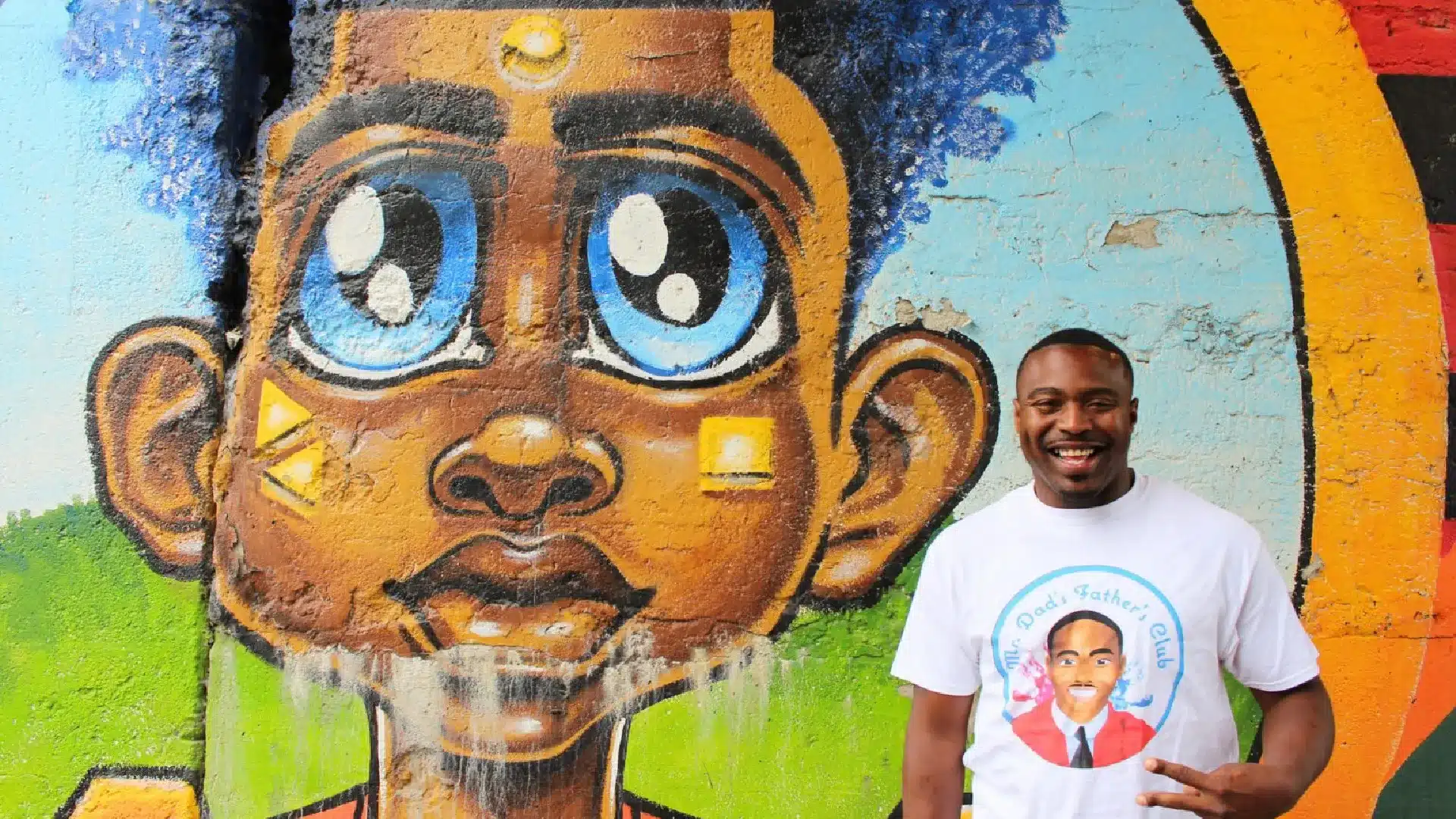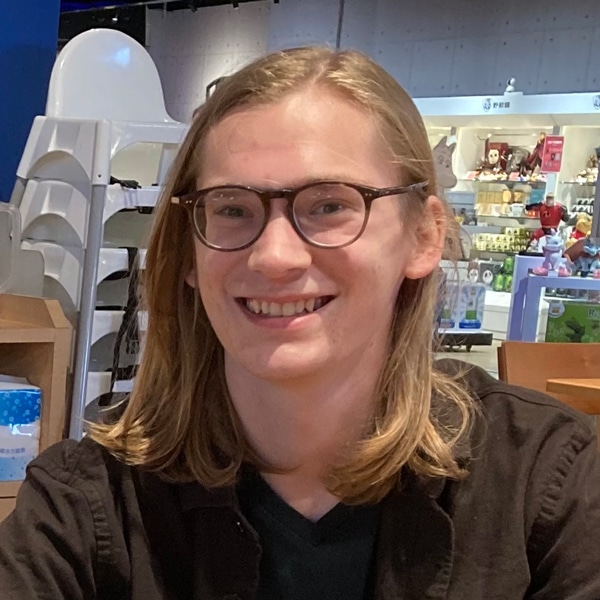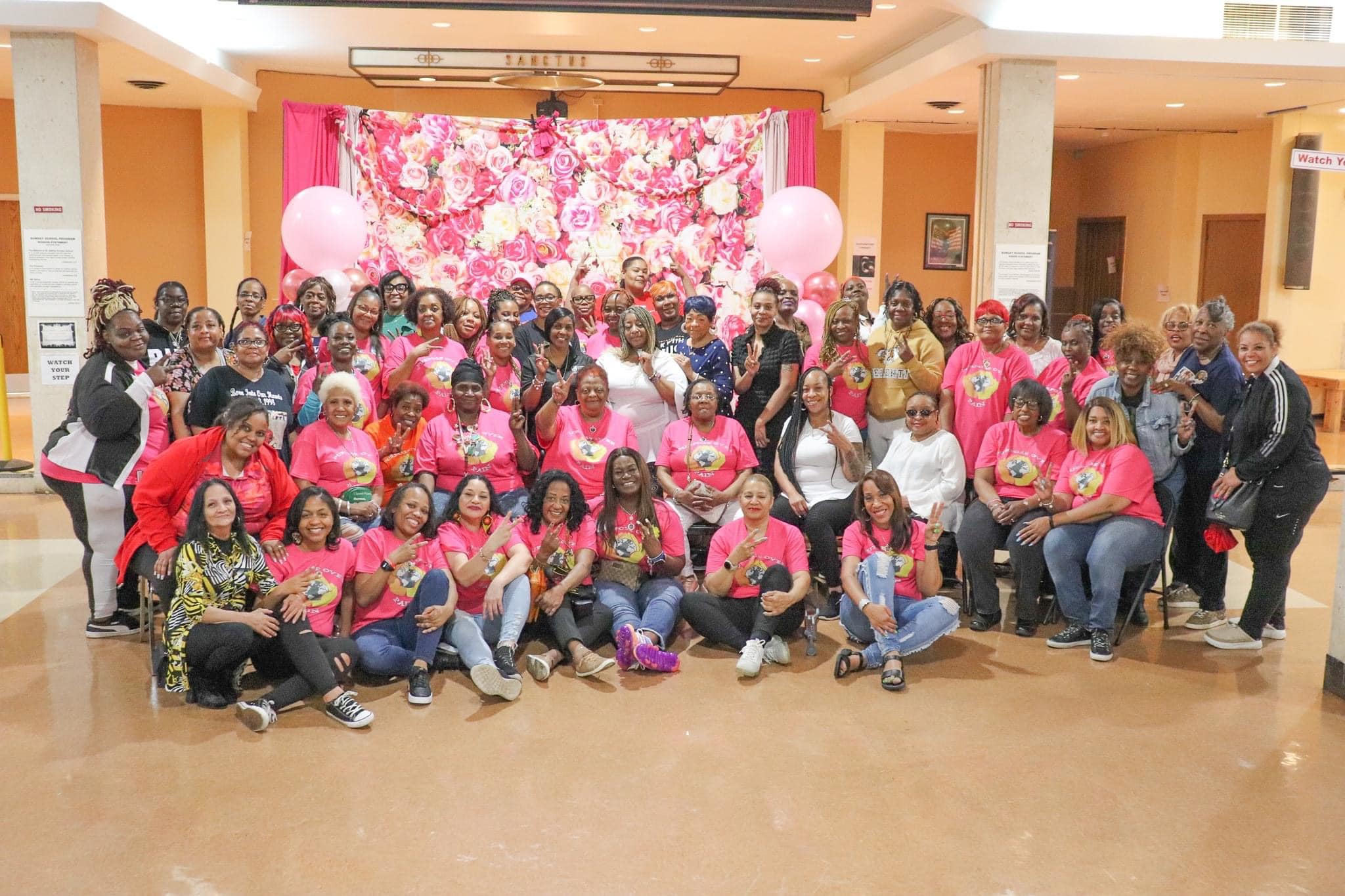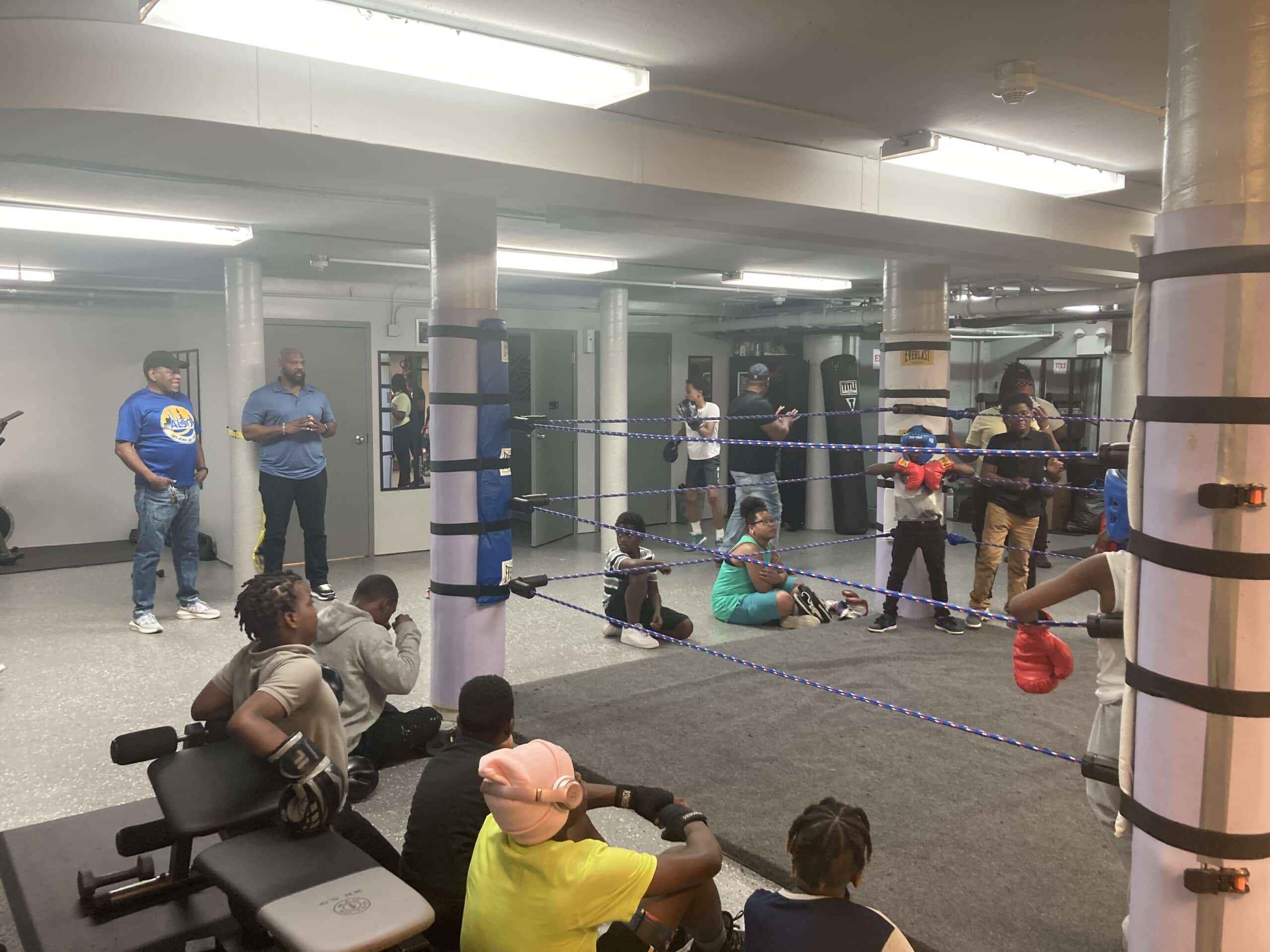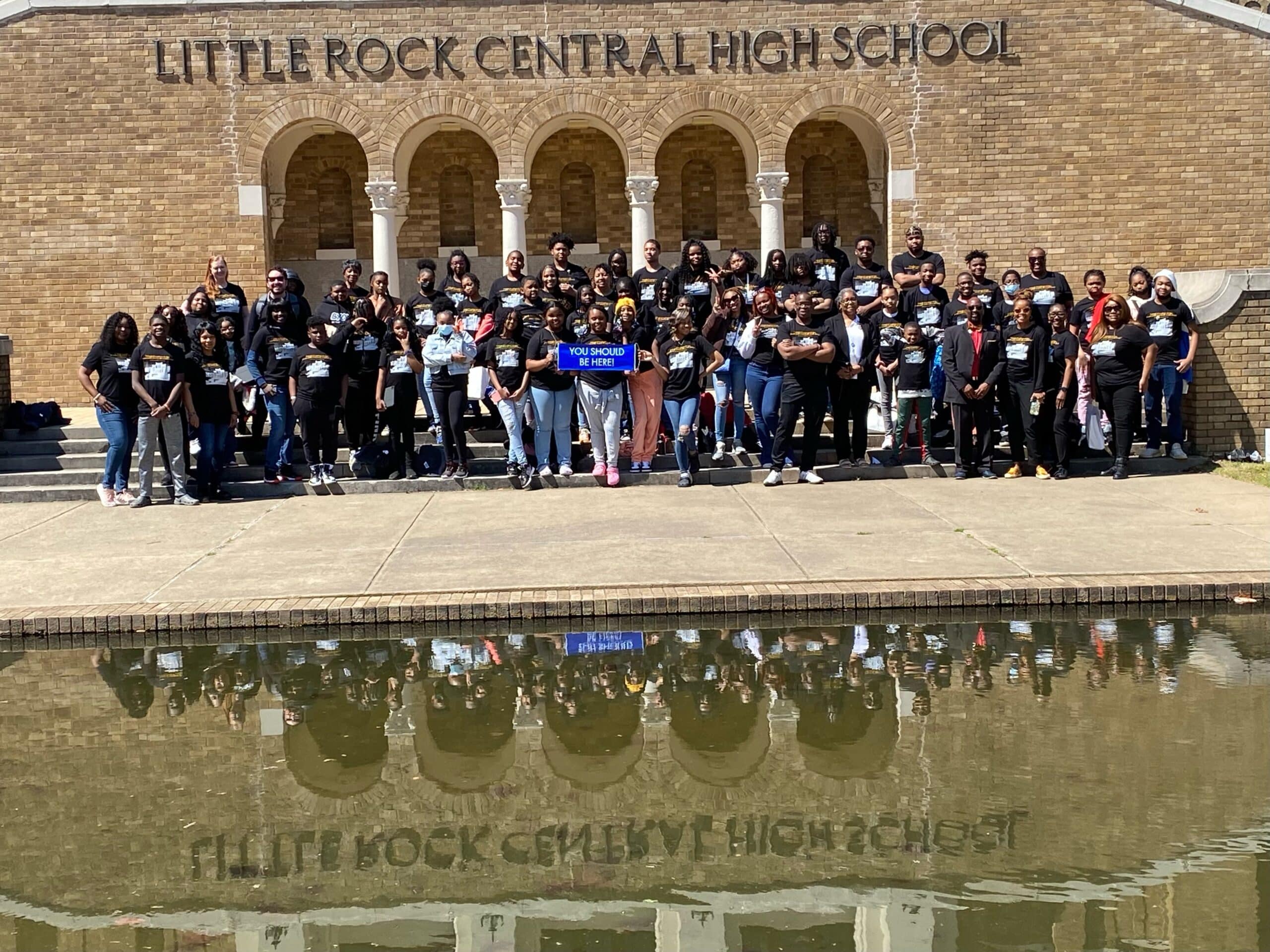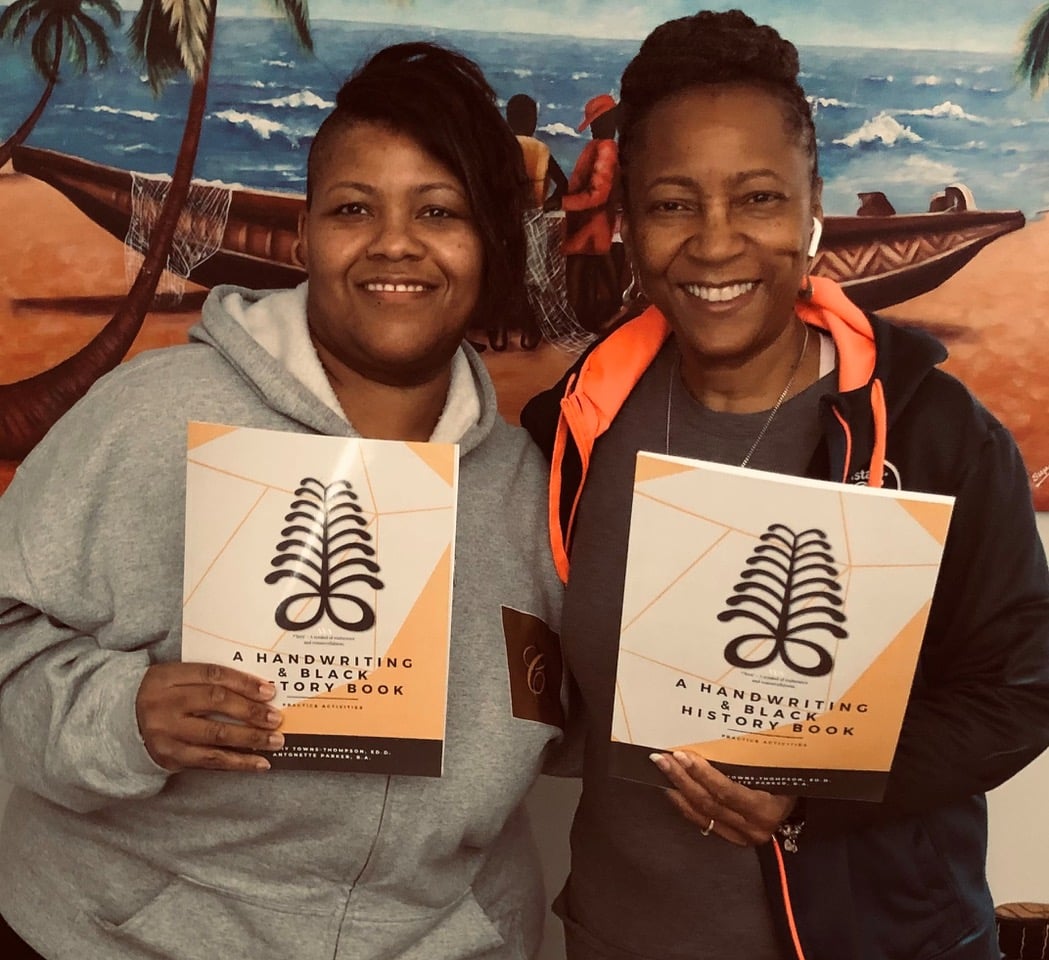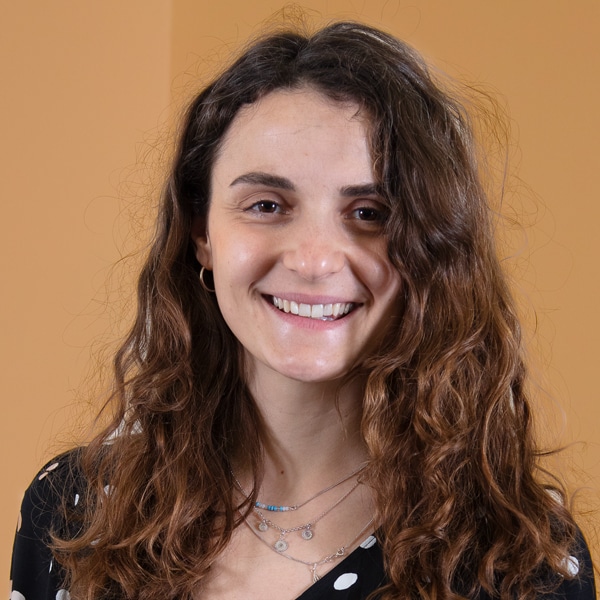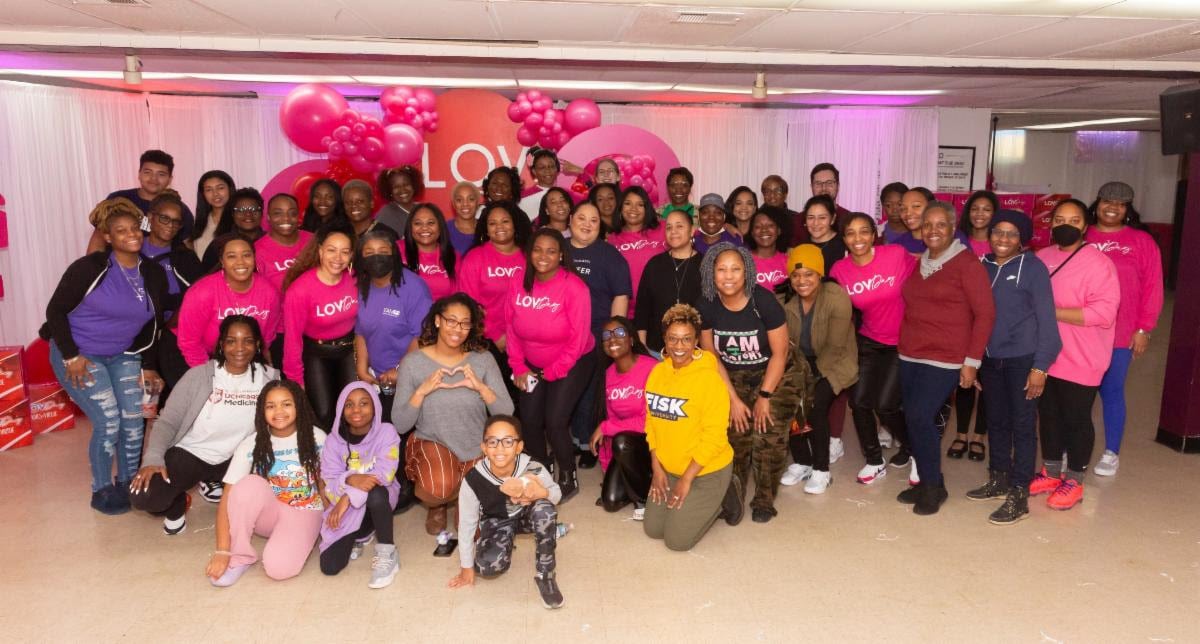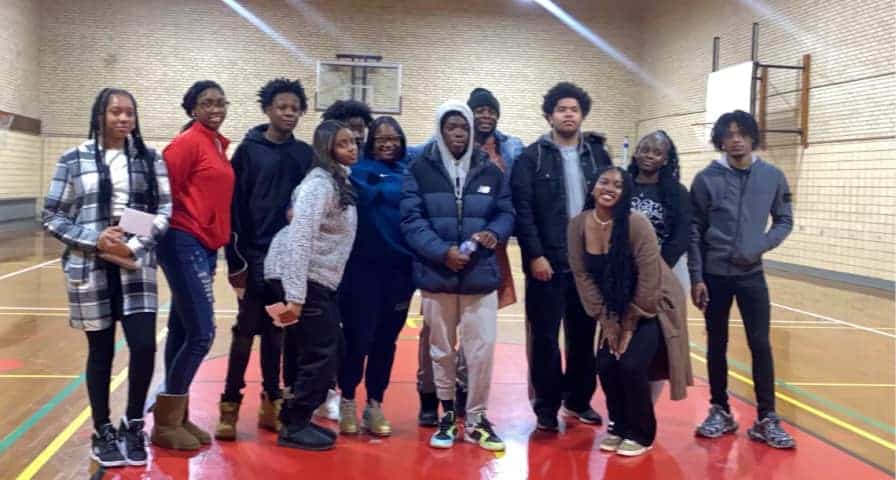Father's Day March Unites Englewood
On June 17, Mr. Dad’s Father’s Club held their fifth annual Father’s Day March in Ogden Park. Mr. Dad’s Father’s Club was founded in 2017 by Joseph Williams, a 2020 Chicago Peace Fellow, to get fathers and male-mentors actively involved in their childrens’ lives. Mr. Dad’s Father’s Club uses literacy and mentorship to nurture the social-emotional learning of Chicago youth so that they are better equipped to handle the world around them. This year, they held their fifth annual Father’s Day March, a family-friendly event filled with food, music, games, and giveaways.
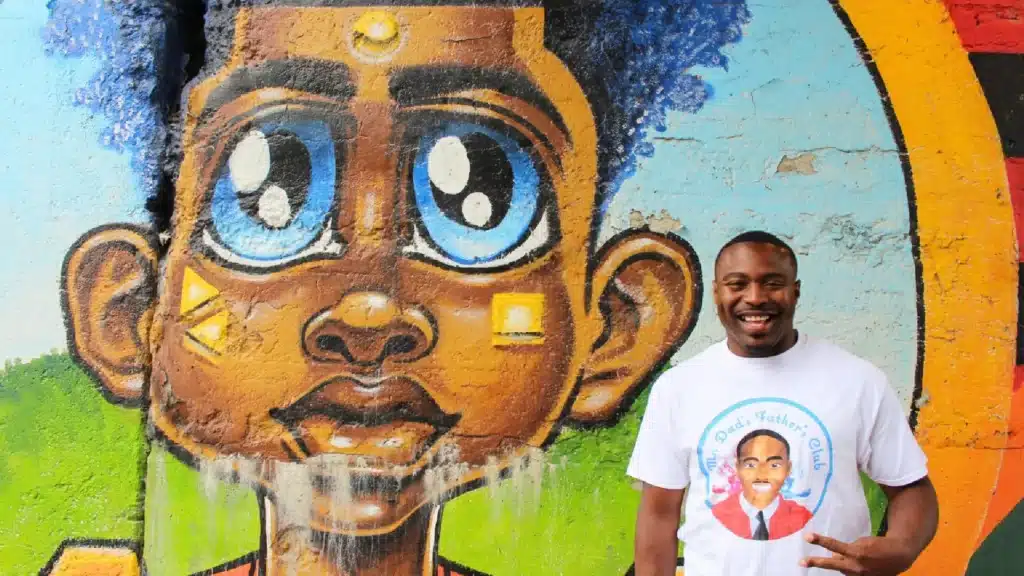
Community Involvement at the Father's Day March
Over the past five years, the Father’s Day March has grown in scale and has gained the attention of local businesses, community organizations, and political figures. All food, entertainment, and services at the parade were provided for free and local businesses donated meals, haircuts, and more. When asked about the development of the Father’s Day March, Joseph noted, “I will never forget when we started the event. We used to do it inside of the park and then we expanded out to the track field. We added dance teams, the Jesse White tumblers, face painters, and so on. Now it’s at the point where last year we had the mayor and superintendent come out, this year we had the superintendent come out again, so it has continued to expand.” As attention to the Father’s Day march has increased, the services provided have also grown in scale with more options for food and entertainment being delivered to the growing audience. In total, over 25 vendors came out to support the event and over 500 people attended.
We were really able to tie together businesses, nonprofits, elected officials under one event, for one cause. Every year we come to bring together peace and unity throughout the community… Each year I think the event might be more difficult to put on as it grows in scale, but it actually gets easier, because the more folks know about it, the more support we get.
Joseph Williams, Founder of Mr. Dad's Father's Club and 2020 Chicago Peace Fellow
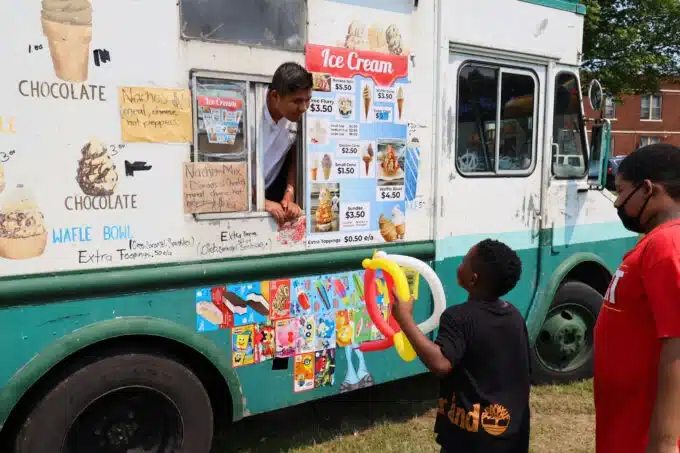
With over 500 people attending this year’s Father’s Day March, it became a site where members of the Englewood community could receive free resources and services while also spending time with their families. This year, Josephine’s Southern Cooking and White Castle donated food, while Michael Airhart of Taste for the Homeless cooked free meals. The Father’s Day March also distributed 50,000 free diapers and provided 100 attendees with free haircuts. By providing free food and entertainment, the Father’s Day March allowed family members to focus on connecting with one another in a fun environment. Attendees were also happy with the resources that the event provided. Tabling organizations provided opportunities for individuals to apply for jobs on the spot, receive phones or tablets with service for free, and other similar services.
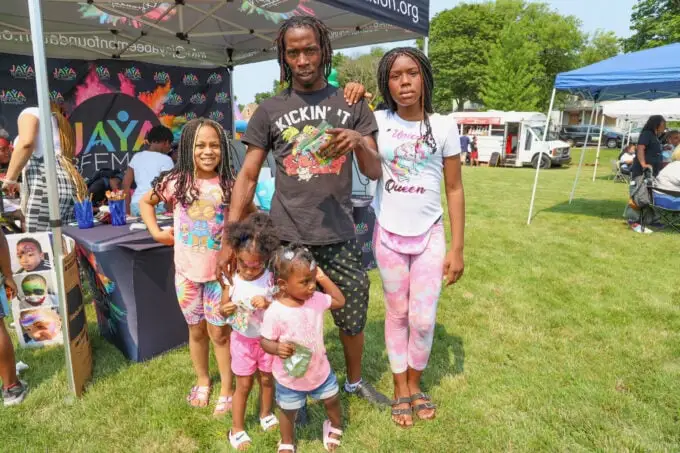
A central goal of the Father’s Day March was to bring attention to fathers’ continued involvement in their children’s lives. The event provided an opportunity to fathers and their children to relax and enjoy free face painting, balloons, an ice cream truck, crafts, and more. At the event, fathers approached Joseph and mentioned how they enjoyed the opportunity to not only spend time with their children, but also to have fun and to have a space in their neighborhood to relax.
For the future, Joseph imagines expanding the Father’s Day Parade to have themes, which would bring more attention to the event and complement the programming. He imagines bringing a carnival to the next Father’s Day March, providing rides, popcorn, ICEEs, and similar fare. As Mr. Dad’s Father’s Club continues to hold Father’s Day Marches for the Englewood community, they will continue to provide foods, services, and entertainment to the neighborhood. This celebration of community and family is the joint effort of community organizers, businesses, and other neighborhood organizations collaborating on a common goal.
A New Resource for Victims of Gun Violence
A new resource for families of victims of gun violence was recently released by 2020 Chicago Peace Fellow, Pamela Montgomery-Bosely. Her organization, Purpose Over Pain, launched a 24-hour crisis response hotline for people coping with the loss of a loved one from violence. The hotline is active from 7pm on Friday to 7pm on Sunday and can be reached by dialing 872-3CRISIS or (872) 327-4747.
Providing Crisis Support for Victims of Gun Violence
Since its inception in 2007, Purpose Over Pain has expanded from a small non-profit run by parents of victims of gun violence to an organization with full-time staff that work Monday through Friday. The organization provides positive development activities for children and youth, advocates for and promotes safer communities, and strengthens families by providing crisis support to parents or guardians whose children have been victimized. Most of Purpose Over Pain’s services are provided on weekdays, which up until now has left a gap in the services provided to families of victims of gun violence over the weekend.
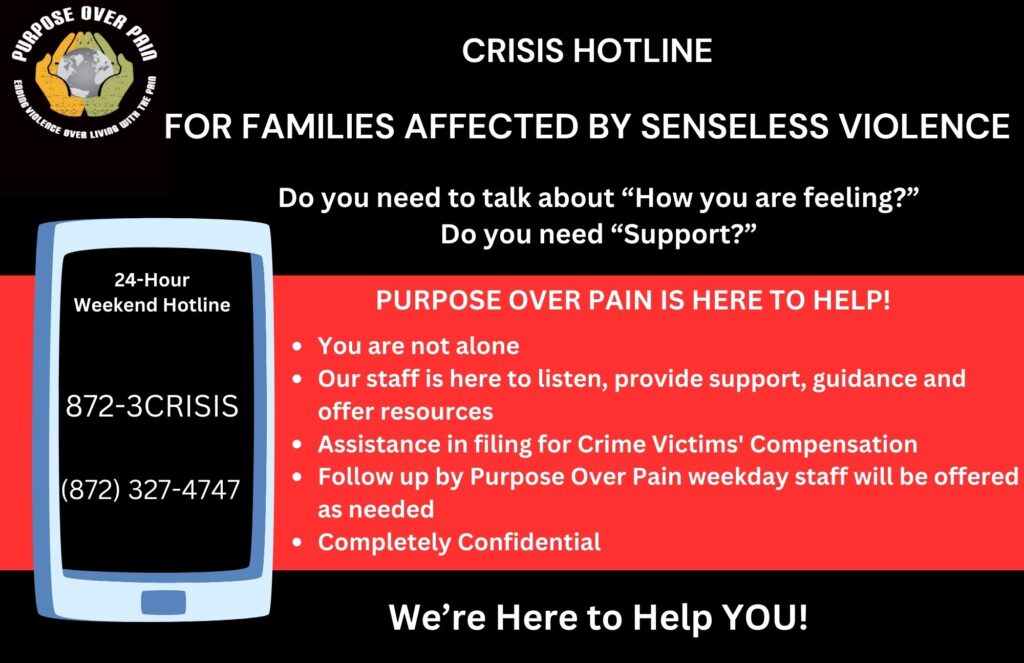
The crisis response hotline is intended to serve families at any point during the weekend, which is when the number of incidents tends to peak. Prior to opening the hotline, Purpose Over Pain would receive messages and calls throughout the weekend from people needing support after friends or family members had been shot. Pam explains: “Over the weekend, people struggle, because that's when the violence is extremely high. So, while we are available Monday through Friday, I wanted to be available on the weekends, but not my full time staff since they are survivors too.”
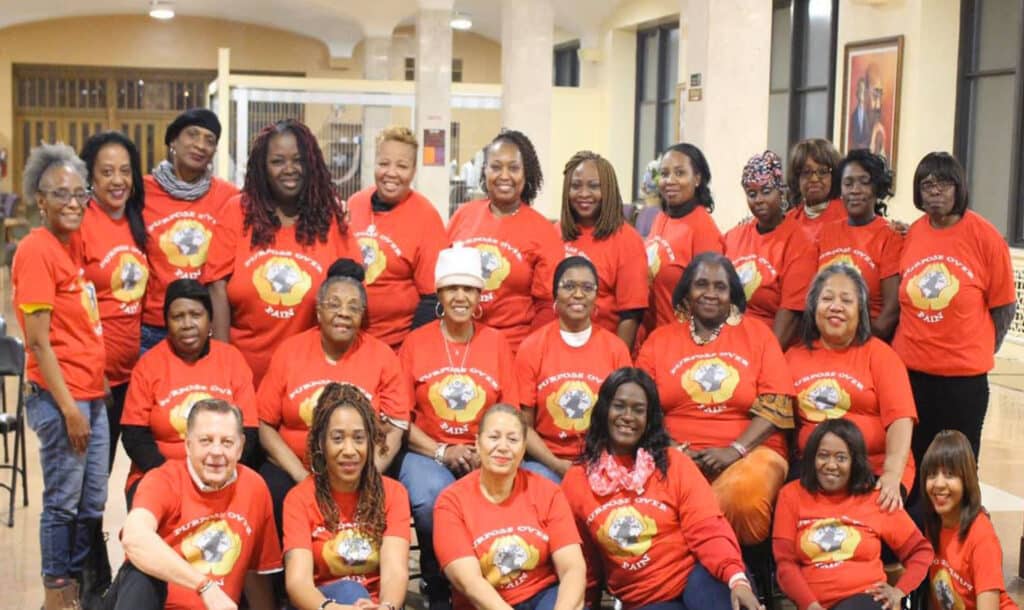
Purpose Over Pain hired four operators to work the gun violence prevention hotline over the weekend, so that Purpose Over Pain’s existing staff would not be overburdened. All of the operators have first hand experience with gun violence, having lost either children or relatives, and are trained to listen to and provide guidance to people dealing with a tragic loss. Pam describes the role of the responders:
We want to be there to support people and let them know that they’re not alone. Our staff is there to listen. Many parents have their children shot and killed in the middle of the night and might receive a call at 2 in the morning with the news. You can’t sleep after news like that, so we wanted to make sure that there is someone there to listen to them, to provide support, to provide guidance, and to provide resources.
Pam also works on the hotline covering for the other responders in case they are unavailable or if it is the anniversary date of their loved one being murdered.
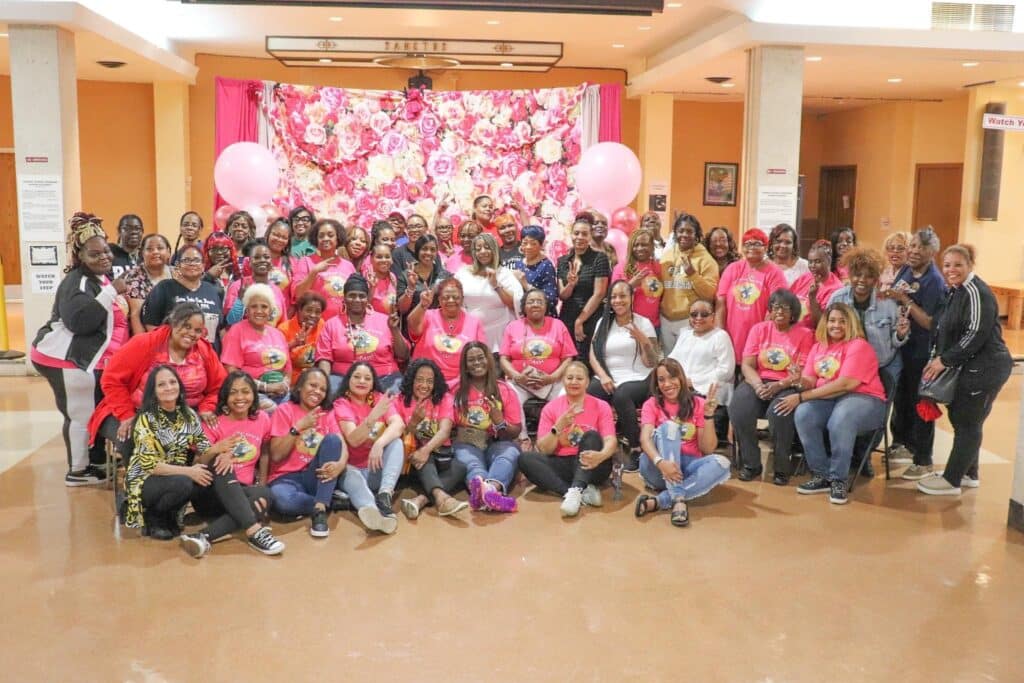
Resources Shared on the Hotline
Resources that the operators can link victims include support circles, counseling, financial resources, and job programs. Purpose Over Pain offers memorial services, support days, and mentoring sessions as part of its regular programming. Hotline operators can also link victims to outside resources. For instance, hotline operators often help victims fill out a Crime Victim Compensation Form. This form is part of the Illinois Attorney General’s Crime Victims Compensation Program which is intended to reduce the financial burden imposed on victims of violent crime and their families by providing up to $45,000 for expenses incurred by eligible victims as a result of a violent crime. Purpose Over Pain also has a full resource book that can link victims to programs that provide housing, food, clothes, and jobs. They network with other organizations, such as St. Sabina’s, so that they can connect victims with resources close to them and that are relevant to their needs.
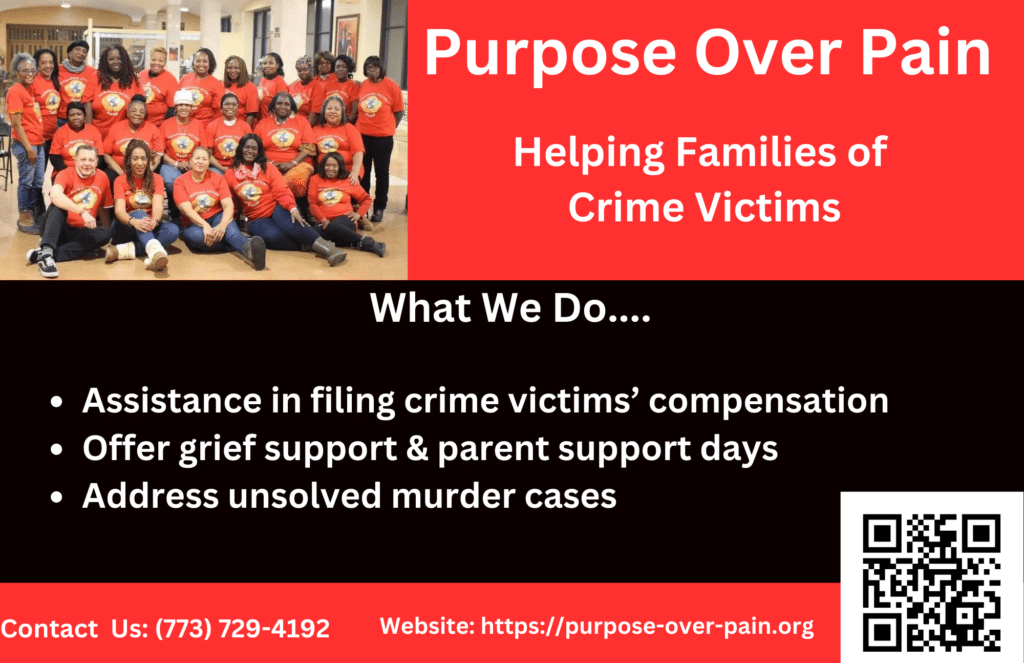
Purpose Over Pain’s hotline is the first of its kind in Chicago, previously there was no 24-hour crisis hotline for the friends and families of victims of gun violence. Now, victims can be supported by community members that have lived through similar experiences. Pam emphasizes, “When you call and they pick up the phone you’ll have a survivor, someone who understands what you’re going through. It’s not like you’re getting an automated message, you’re getting a live voice. I don’t want people to think they’re alone because they’re not, we’re here for them.” The Purpose Over Pain hotline has been created by community members for community members and will continue to provide pertinent and needed care.
West Garfield Park Boxing Club is a Haven for Youth
Brothers Tony and Sylvester Raggs recently started a youth boxing club in West Garfield Park. The club, Boxing Off the Block, is intended to teach young people from ages 13-18 discipline and the skill set of boxing. The club is located in Bethel Lutheran Church & School, and training is held on weekdays from 4pm-8pm. It is the Raggs brothers’ goal to encourage good habits in young people through the club and provide a space in which they can feel safe and have positive role models in an area where gun violence is a serious problem.
A Boxing Club that Provides a Safe Space for Youth
Boxing Off the Block serves as a haven for families in and around West Garfield Park. Tony, a 2021 Chicago Peace Fellow, has worked in violence prevention since 1981 and has served as a volunteer street outreach worker in West Garfield Park and West Humboldt Park. He and his brother Sylvester have worked alongside one another on projects working with youths and adults dealing with issues of violence and community outreach. They have used music and entertainment as a way to build community, with boxing later becoming an addition to that work. Over the course of the last two years they have found funding, trainers, and a space for their youth boxing club. They have been holding the club in Bethel Lutheran Church since October of 2022. Though the club is intended for teens aged 13-18, mothers and younger children also come to workout, box, and watch the teens spar.
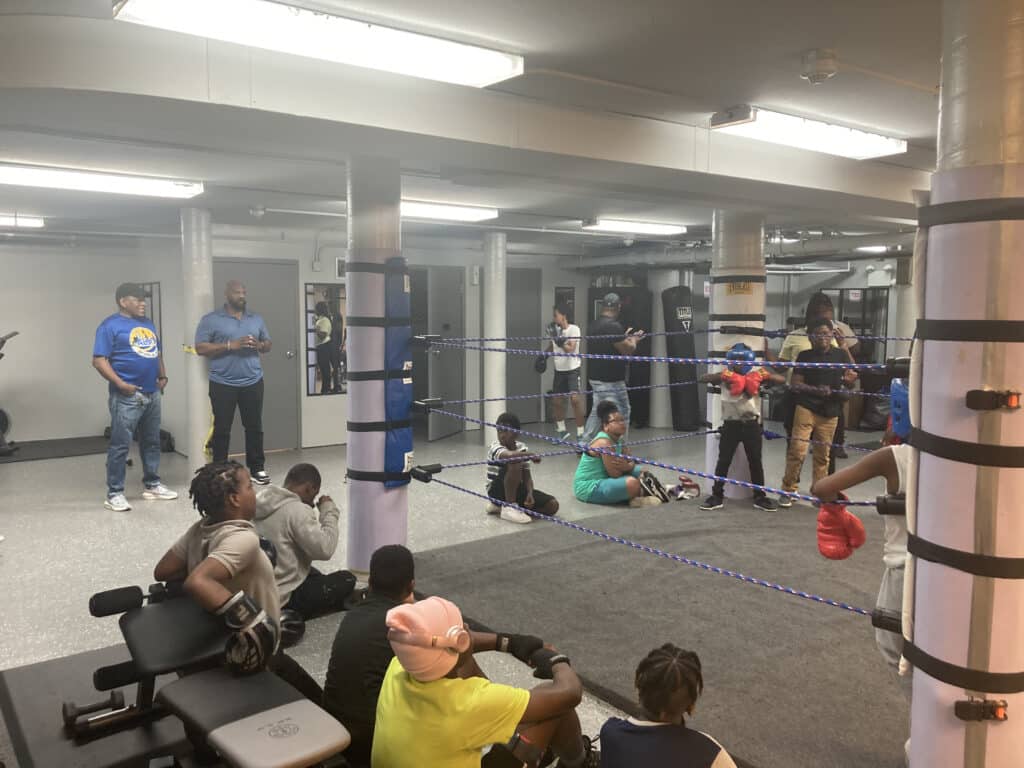
The club is stocked with workout equipment and trainers that provide the necessary tools for young people to learn boxing. The space includes a 10’x10’ ring that the brothers built themselves, punching bags, weights, and stationary bikes. They have hired two boxing coaches as well as a conditioning coach to train the young people who attend and they provide dinner for them as well. Activities are split between two groups with ages 13-15 training from 4pm - 6pm and ages 16-18 training from 6pm - 8 pm. Each group has around 15-20 young people attend.
Coaches Provide Mentorship and Structure
The coaches at Boxing Off the Block are often teens’ first mentors in boxing, providing them with training regimes and encouraging them to keep up their routines. The strength and conditioning coach, Travis Whittington, mentioned that he uses the discipline of training as a way to encourage good behavior in the gym, “when kids act out I ask them to do push-ups or run a lap so that they know what we’re here to do.” Travis provides personal coaching for the teens, giving them regimens to do outside of the gym. This is often teens’ first structured workout regime, so it provides them with a structure for building a habit of exercising.
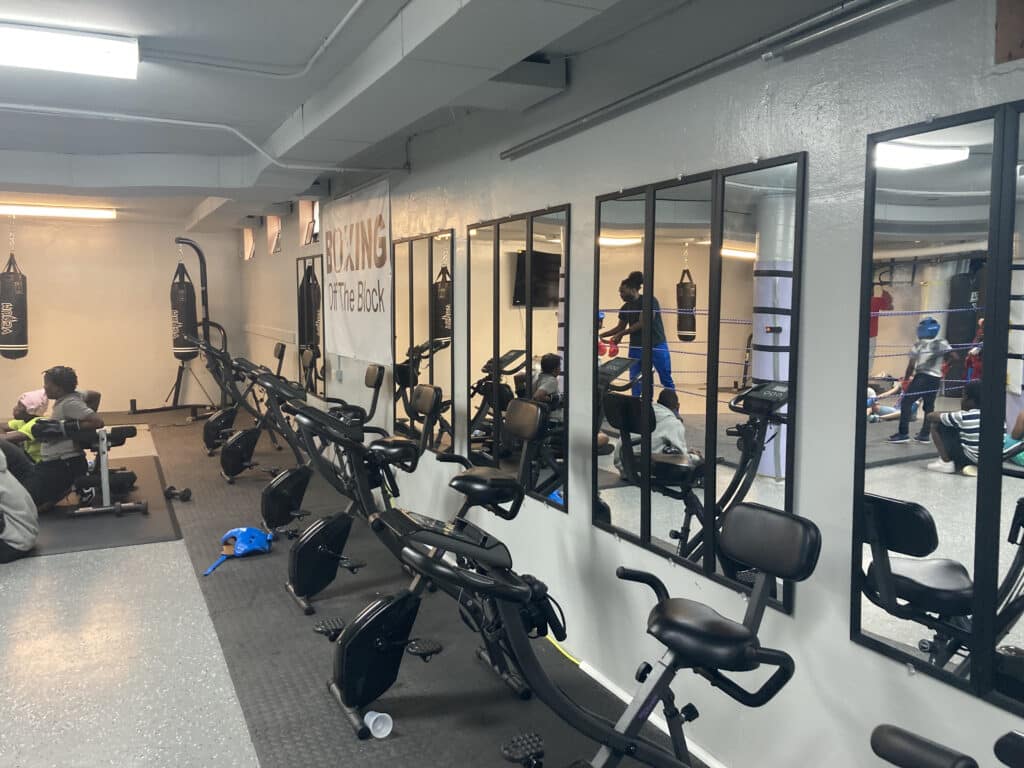
The two boxing coaches, Shawn Boyd and Levelle Whittington, emphasize the technique of boxing and its demands for control of the emotions. Shawn stresses that boxing acts as a form of stress relief and that a cool head is required to win rounds in the ring. He noted that the young people he sees excel at boxing are those who “are able to keep up a technique in a fight rather than resorting to street fighting.” Part of their hope in encouraging this kind of mindset in the youth through boxing is to help them deal with the possible threat of violence on the streets. They hope that by practicing the skill of emotional regulation in the ring, teens will be able to keep calm when confronted on the streets to know when they should back away or practice restraint.
Coach Levelle Whittington sees himself and the other boxing coaches as positive role models for the young people. He noted that many of the young people who attend the club have lost family members to gun violence and lack guidance. Boxing coaches can provide some direction and guidance by teaching the value of discipline, technique, and emotional regulation. Levelle also noted that boxing has the potential to distract from other more dangerous behaviors because it is something that can be framed as cool. Being cool allows boxing to compete with other interests, such as drugs or guns, and channels that energy into a positive direction.
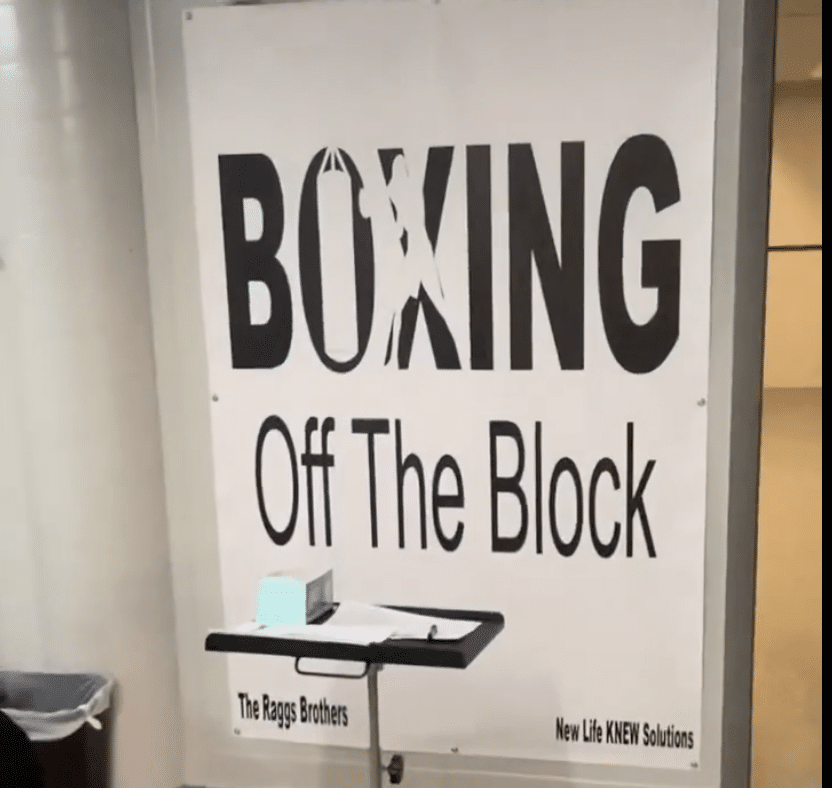
Boxing is not the only thing taught at Boxing off the Block, with a community of trainers, coaches, and students teaching the value of cooperation, self-control, and the study of technique. The club is quickly growing, with members from outside of West Garfield park also joining to learn the skill of boxing. It is the Raggs Brothers’ hope that the club will continue to gain both resources and members so that they can build community and encourage positive values in young people on the West Side.
Chicago Youth Boxing Club: Building Community, Character, and Togetherness
By: Sylvia Del Raso, 2022 Chicago Peace Fellow and Board Treasurer, Chicago Youth Boxing Club Inc
Almost 15 years ago, I was asked to join the Chicago Youth Boxing Club (CYBC) board, a nonprofit sports-based youth development program serving the North Lawndale and Little Village communities on the southwest side of Chicago. What I started as a six-month commitment, I am continuing to this day as a rewarding initiative where young people can resolve their difficulties, find community, and prosper in the sport and beyond.
I remain, to this day, a volunteer and an avid supporter of the mission of this boxing club, which provides an outlet and safe space for youth and acts as a preventive measure to avert young people away from potential gang activities. I have experienced many fulfilling moments during this work.
One of the best and earliest moments was around 12 years ago when one of our young people, then nine-year-old Felix Gonzalez, was apprehensive about getting up in the ring; then he won. His happy glow still stays with me.
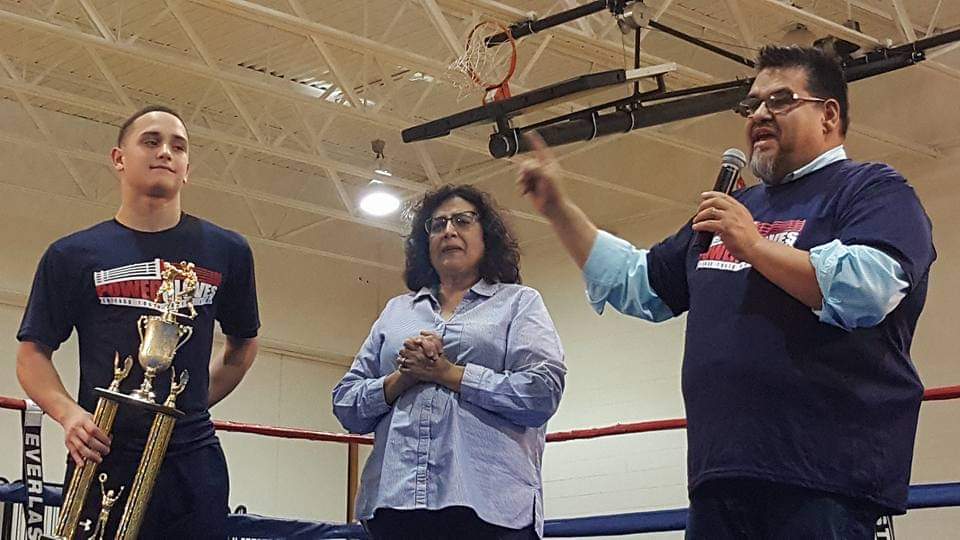
I remember thinking: I am in it. It is helping them [young people], and I am helping the community. Felix grew up and recently came to thank us, this time under the uniform of a Chicago Paramedic. Seeing how he came back as a 22-year-old made me, once again, understand how crucial it is for the community to maintain our service to them, and how long-lasting our positive impact is.
Now, we are serving approximately 140 young people. We offer them a boxing club and a place that listens to them. This platform helps them build discipline, character, and self-confidence and allows them to add value to their future. We talk to them about going to school, about possibilities to graduate and, to go to college. We offer scholarships and guide them. It is more than just a boxing club.
A Place of Many Benefits
Regrettably, our neighborhood is not among the best in Chicago; however, there is a lot of hope and talent here. Our community needs something like this because we only have a few activities for youth.
I see the commitment from the kids; they want to be better. Sure, there is a lot of work because some kids come with baggage, from broken homes, suffer from anger issues and anxiety, and have dealt with hard things in life.
Witnessing the meaningful impact of our club on young people, their families, and the community throughout all these years gave me all the encouragement and reasons to work and spread the word about how this place helps marginalized youth.
I work the night shift at my full-time job with the U.S. Postal Service, so I can come to the boxing club during the day and do what is needed as a Board Treasurer.Still, this is not the hard part of the job. This has so much value for my community; I don’t see it as a job. The difficult part is convincing our funders and others that boxing is good for our community.
Some people still don’t see boxing as a good sport for kids. A lot of people still perceive boxing as violence.From my experience as an observer, boxing needs a lot of discipline – and this club creates and maintains the ties required for the betterment of our community.
I have seen many kids coming in here with anxiety and anger. They think they can take on anyone. However, when we put them in a ring, they cannot take a round because it takes a lot of conditioning. At this point, they take it as a challenge that changes their attitude.
I see them grow; I see them engage for the better. Besides the youth themselves, I have seen firsthand how the community respects what happens in this church basement. In Mexican culture, boxing is very integral in our lives. This is a sport that Mexicans like a lot, so we see a lot of families coming here.
Looking Forward, While Cherishing our Progress
Initially, people saw boxing as violence. But then they started to see that these kids were not fighting but boxing. They started to see that thanks to this club, these kids were staying out of street fights and were being more respectful.
It was new for the community that these kids were also competing nationally. Our kids have gone to Utah, California, Missouri, and Texas. We had four Olympic contenders right before COVID-19 hit. The community started changing their perception when they started seeing the results of our work. We are constantly open to the community, and we engage them.
We open the gym and we invite everyone to come and watch the kids. We learned that before kids go to compete, they get nervous and want to take a step back. So, we do sparring sessions here and invite family and friends so kids start familiarizing themselves with the competition. We also hold community gatherings that include food, entertaining games, and fun together.
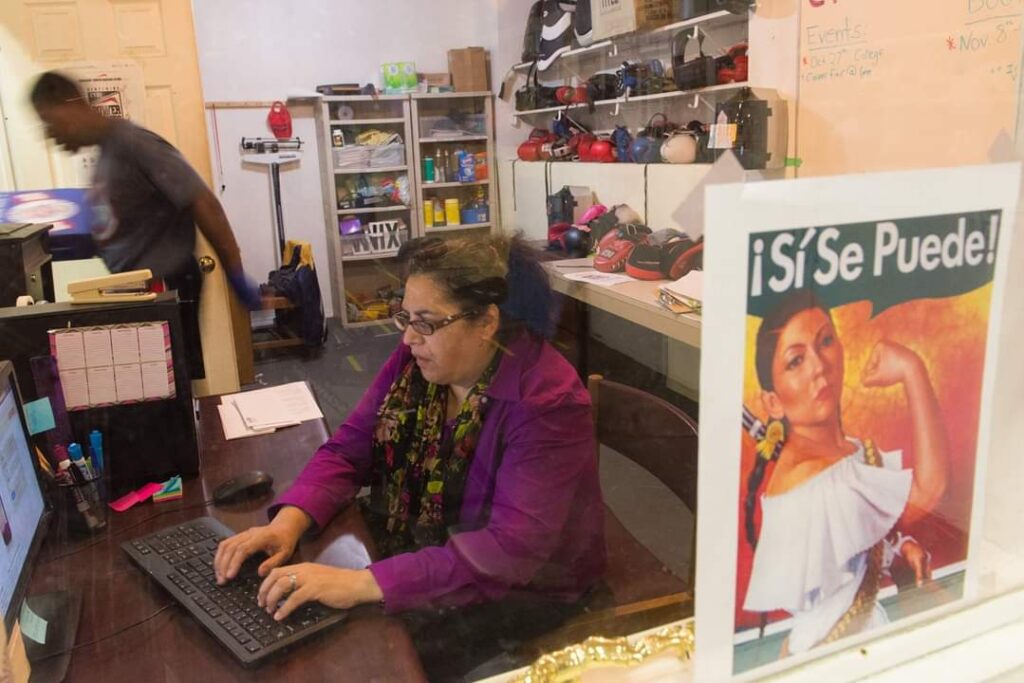
Enhancing Brown and Black Cooperation
Little Village is separated into North Lawndale (mostly Black) and South Lawndale (primarily Mexican). We unite the kids from both sides. We promote unity and show them that brown and black can work together, engage, and love each other.
This aspect of our work brings me closer to Goldin Institute’s mission and its community-driven approach to social justice. Participating in the Goldin Institute’s Chicago Peace Fellows Program in 2022 taught me to speak my mind and be more open. I gained many friendships and networking from the Goldin Institute; it is ongoing. Just because I graduated, it doesn't mean that the connection ended. I see it as a valuable process and appreciate the process Goldin Institute put me through. They brought me into Chicago neighborhoods that I would not go otherwise.
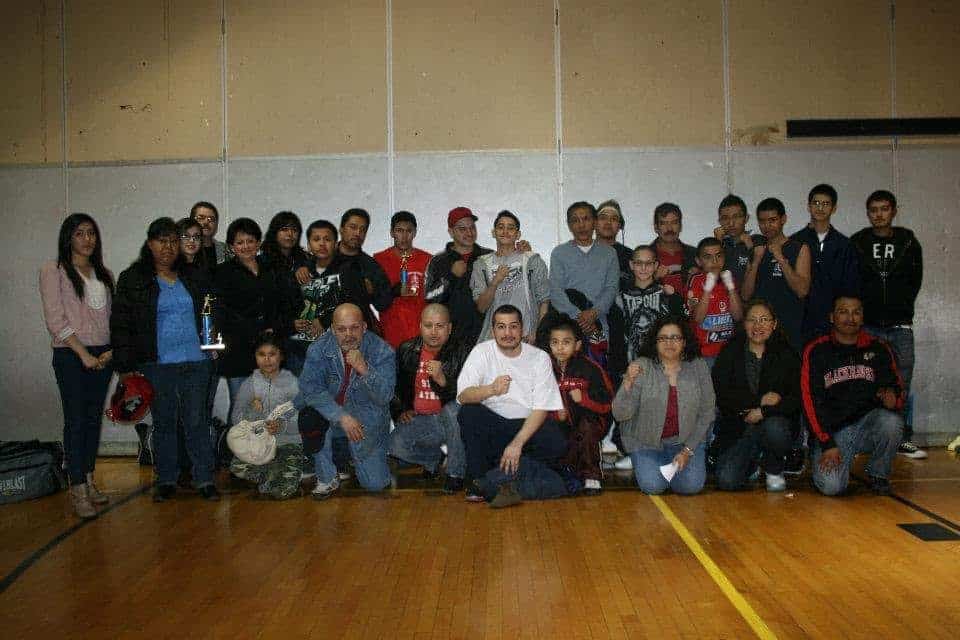
***
For the symbolic amount of $25 a month, anyone aged eight and up can join our club and be a part of our growing community.
Another way to be part of us and support us is by donating.
Whichever form of contribution you choose, we will wholeheartedly appreciate it.
Students Visit Little Rock to Explore the Civil Rights Movement
On March 28, the LUV Institute arranged for 60 middle and high school students to travel to Little Rock, Arkansas, to learn about the Little Rock Nine, the group of nine Black students who enrolled at the formerly all-white Central High School in Little Rock, Arkansas, in 1957. The Love, Unity & Values (LUV) Institute has been working with underserved youth since 2012 to inspire hope and empower them with economic opportunities while building resiliency and social-emotional competencies. Cosette Nazon-Wilburn, Executive Director of the LUV Institute and a 2020 Chicago Peace Fellow, formed partnerships between the LUV Institute, local schools, the Illinois State Board of Education (ISBE), and a community of teachers to facilitate the trip.
Students at University of Chicago Charter School and Ariel Community Academy participated as a part of LUV Institute’s bi-weekly Media Empowerment Program. LUV was able to expand the program this year through funding from the ISBE’s Phillip Jackson Freedom Schools Grant. The LUV Institute has held Journey to My Better Self programs for the past eight years, but this is the first year that the program has included an out of state trip. The programs prepare youth and young adults ages 16-24 to be job-ready for economically sustainable employment in high-growth industries and occupations. The Media Empowerment Program focuses on training students in journalism and storytelling.
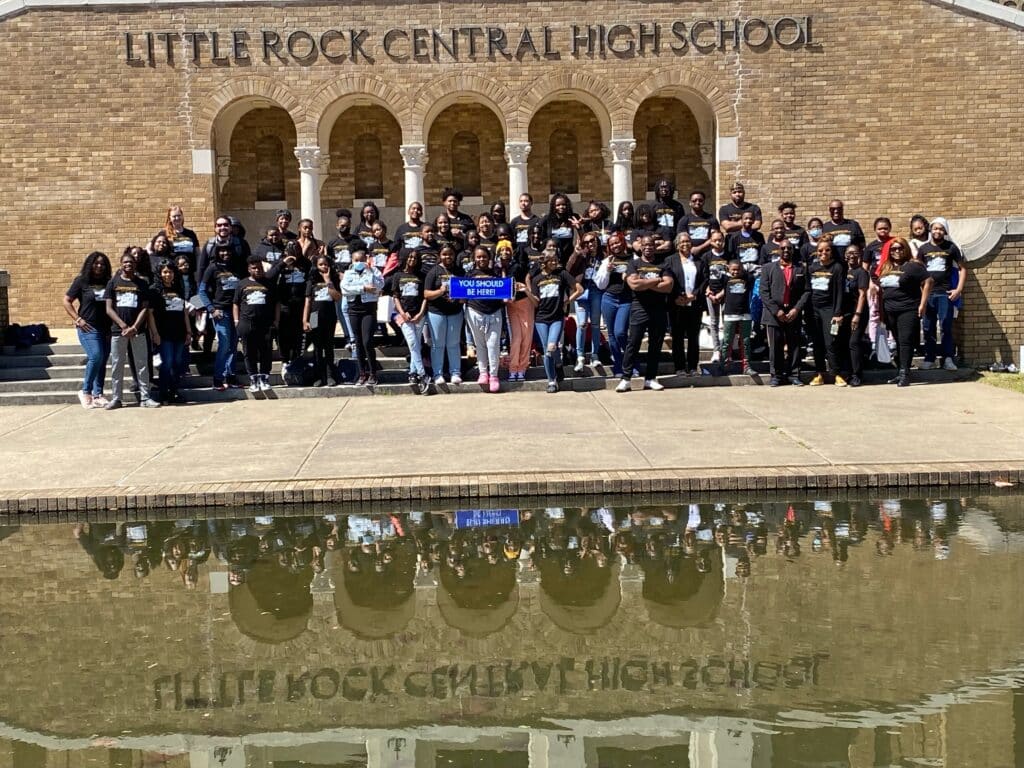
The LUV Institute also hired teachers from University of Chicago Charter School and Ariel Community Academy with funding from theFreedom Schools Grant. The grant is intended to fund a Freedom Schools network, offering a research-based, multicultural curriculum during the summer and/or school year to improve outcomes for low-income students. This funding allowed the LUV Institute to pay particular attention to hiring teachers from neighborhood schools to take part in the program. Each teacher was paid $60 an hour, which is higher than what teachers are usually paid to work for afterschool programs. By hiring neighborhood teachers, the LUV Institute not only contributed to the community of teachers but also invested in the schools they teach in. Teachers, deans, and administrators also learned restorative practices, which provided them with tools to improve their classrooms.
Leading up to the trip to Little Rock, the LUV Institute taught a six-week course on the Civil Rights Movement. The curriculum for the program aimed to teach students how to tell stories under the lens of racial healing and grasp the idea of looking at history as a way forward. The curriculum was provided by nonprofit Facing History and Ourselves, and was designed to create a pathway for young people to explore Little Rock Nine narratives within their own lives. One of the books offered as part of the curriculum is ”Warriors Don’t Cry: A Searing Memoir of the Battle to Integrate Little Rock’s Central High” by Melba Patillo Beals, one of the Little Rock Nine. “Warriors Don’t Cry” emphasizes the role media played in theLittle Rock Nine and the Civil Rights Movement as a whole, making it a strong tie-in to the program. Students were also provided with iPads to document their experiences and participate in the curriculum.
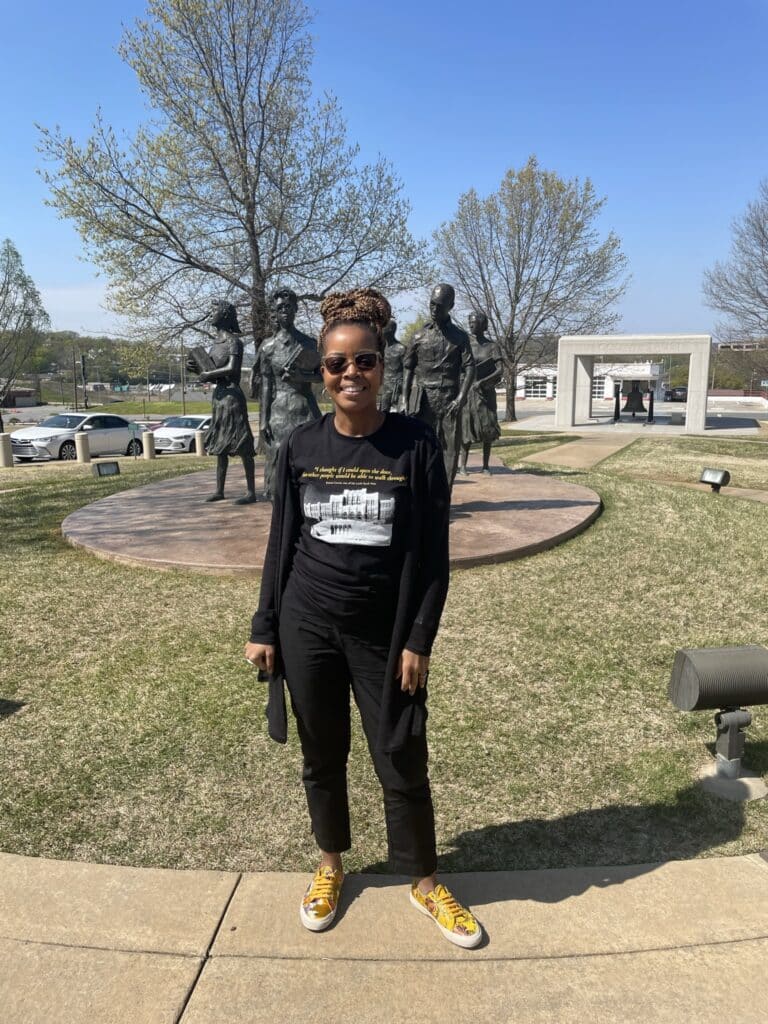
There was an additional layer of opportunity for high school students who took part in the program as they received leadership training and served as mentors for the middle school students. Both high school and middle school students took the course side-by-side to learn history and create their own narratives. All of the high school students who participated attend University of Chicago Charter School in Woodlawn. The next phase of their project is to create a mosaic that will be at the school and serve as a reminder of their experience.
When it came time to visit Little Rock, the students had a full day of activities, visiting Little Rock Central High, the Arkansas Capitol building, as well as various memorials. Central High is now a National Historic Site and students were able to visit a memorial park, the historic Mobil/Magnolia gas station, and the visitor center. On their trip, students watched a documentary about the Little Rock Nine and also got a chance to see memorabilia and purchase souvenirs. The trip included a visit to the Arkansas Capitol Building, which features a statue of every member of the Little Rock Nine, as well as quotes from them.
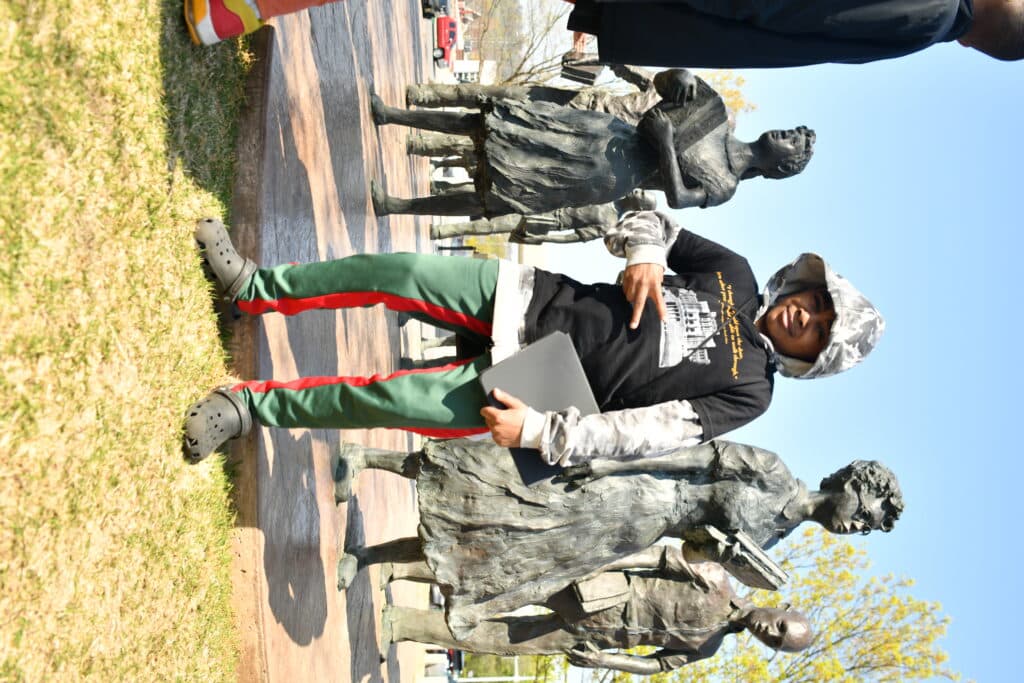
The visit to Central High revealed the resources offered by the school's campus and how the diversity of the school has advanced since the integration of the Little Rock Nine. They met with two assistant principals from Central High who provided updates on the current status of the school. The assistant principals emphasized the diversity of Central High, which now accommodates students internationally who speak over 30 languages. Today, young people all over the world attend Central High, since it is a large school with the resources to support a diverse student body.
As students visited Central High and other historical sites related to the Little Rock Nine, they reflected on their own experiences and the current opportunities they have to address social injustice. Cosette emphasizes that the trip was intended to have the students ask, “What are the Little Rock Nine situations in my life? What have my parents and grandparents had to do? And when have I had to stand up to injustice?”
Visiting Little Rock will hopefully inspire ongoing leadership within the students. By focusing on the Little Rock Nine, who were kids between the ages of 14-16 when they transferred schools, the curriculum focuses on young peoples’ capacity to be change makers.
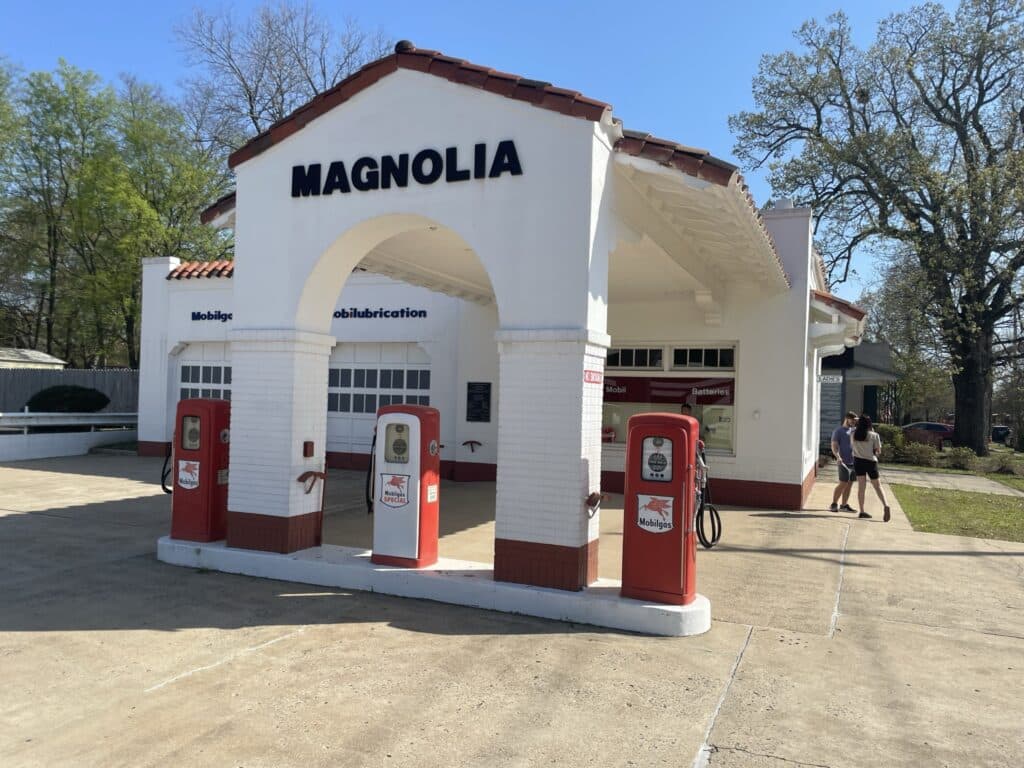
Opportunities for reflection were extended to the families of students. One of the adult chaperone’s is the grandmother of one of the children in the program. She stood on the street in front of Central High and provided testimony of what happened when the Little Rock Nine were escorted into the school by the National Guard. She noted how the neighborhood around Central High used to be an entirely white neighborhood and has now become a Black neighborhood. She also talked about how the Little Rock Nine saw Central High School as an opportunity for educational advancement. Central is a large high school close in size to a college campus, which was a stark contrast to the much smaller all-Black Horace Mann High School that was built during the same period.
Following their visit to Little Rock, the students’ experience of the trip will be used to tell their own stories. They used their iPads to create narratives about their trip. A documentarian accompanied them and will work with the students to combine their narratives and footage to create a documentary. Through connecting with history and actively applying it to their lived experiences, the students will see the importance of telling their own stories and engaging with their community.
A Reflection on Black History through Handwriting: An Interview with Dr. Dorothy Thompson
2021 Chicago Peace Fellow, Dr. Dorothy Towns-Thompson and her daughter, Antonette Parker, a teacher, recently co-authored three books on Black history and handwriting for children of all ages. Dr. Thompson has over three decades of experience as an educator, alcohol, and drug prevention professional, administrator, and ordained minister and has used the skills she acquired community activist and teacher to author these books.
The books cover arts, social studies, and social-emotional learning. They also include a motivational word for each letter of the alphabet, a definition or explanation of the word, and historical locations and personalities. The author also focuses on the importance of inter-generational connections and the need for communication within families and schools.
A unique aspect of these books is their spotlight on cursive writing and handwriting as a way of inscribing and honoring Black history. Dr. Thompson stresses that the books are not only a step further in bridging the educational gap in our society, but also inform future action-oriented strides.
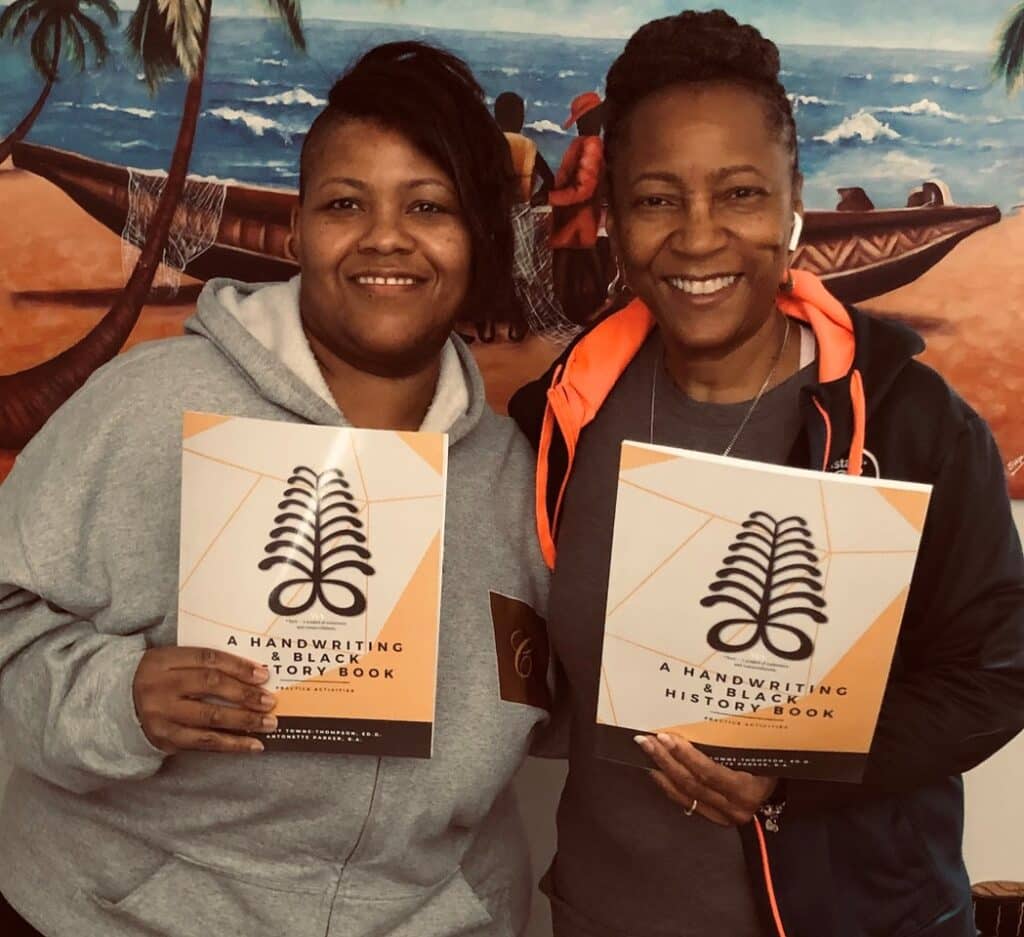
Flipping the Pages
The facts, photos, and biographies encourage youth to do more research on Black history once they read the books. Volumes 1, 2, and 3 of the books, released in February in connection with Black History Month, are for children of all ages, focusing on the experiences of Black people. "One reason I thought to write this is that I did not want just to have a book dealing with history or writing. My daughter and I also added inspirational messages. The book is divided into three volumes: primary, intermediate, and upper,” she elaborates. Each book cover has a distinctive color influenced by the Ghanaian Flag.
"The first Book is for primary students (Grades Pr. K - 2) and has a golden cover. It begins with “A stands for Africa,” with pictures on that page. It continues, “Africa is a continent, and America is a country.” We know that some children often cannot read books in the primary grades. Still, adults can read to them, drawing that emotional connection between the youth and adults." She adds, “The African diaspora spans from sea to sea and connect. And, through the books, people can see the connection. "There is also a sense of unity in this," Dr. Thompson added.
Book two is for intermediate students (Grades 3 - 5), and its color is green. It has the exact format followed by the book one, but the handwriting practice is in cursive. "To me, there's a need to be able to use the pen and paper where students are learning cursive writing because many young people don't know how to write in cursive. They have difficulty reading cursive." She shares that cursive writing is helpful to learn because it not only helps younger people decipher others’ handwriting, but also it is usually helps them to write a little faster.
The third book is burnt orange, representing the red of the Ghanaian flag. Dr. Thompson explains that "This book serves students in upper grades or higher (6 and up), and each letter of the alphabet includes two noteworthy historical figures." She further talks about how they chose specific people from the Black community while considering the goal of increasing connectedness and celebrating accomplishments: "You have famous Black people that people heard about like Dr. Martin Luther King, or Jennifer Hudson and George Foreman. But we also have people who were in art, or who were scientists. We have Eleanor Samuel, a scientist, and physicist. Or, the mathematician, Walter Mosley. " Dr. Thompson explains that they wanted young people to see Black people who are historians, politicians, performers, and athletes too. "It varies. We picked different people who have contributed to the history of Black people." The inter-generational connections are vital to her; she says adding they want to keep it going.
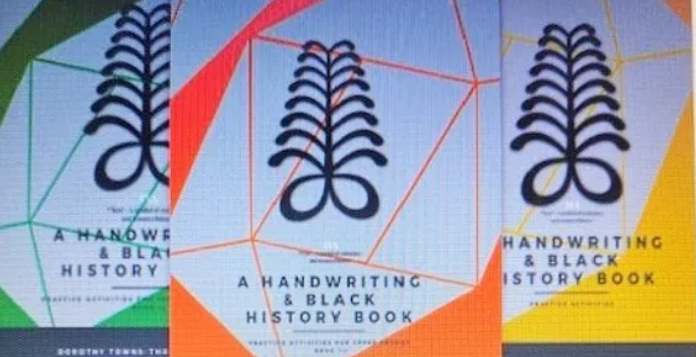
A Better Understanding of Black History
Dr. Thompson and her daughter also reflected on the relationship of their books with Black history overall when writing them. “A lot of times, young people, sometimes even people in general, do not see the connection between the relationship of Africans and African Americans. [...]. Because of the history and slavery, and how we represent people from different parts of the world and continents."
Dr. Thompson designed her books to highlight the need for people to see the rich history and how Africans and people from the African diaspora contributed not only to America but to various places worldwide. "Many times, young people and other people just see the negatives of Black people. That is why I say the book is not just for Black children, our children, or people in general. It's just to show that contributions have been made and continue to be made by Black people." She believes that having opportunities for communication within families or even in schools is so important. "I do not see my book only being used in schools. I see my book also part of family relationships." she adds.
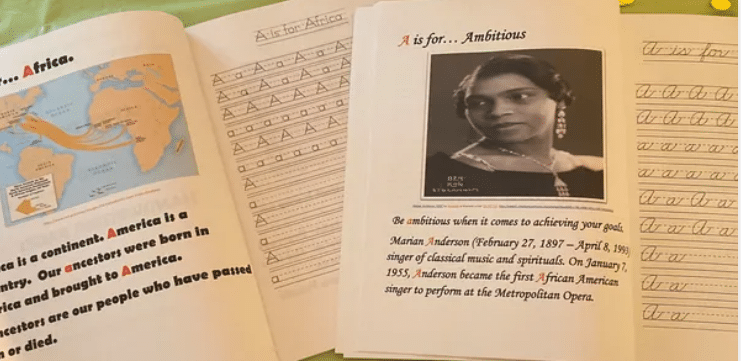
The Meaningful Mother-Daughter Cooperation
Dr. Thompson and her daughter Antonette adopted a division of labor concept as they collaborated on the book. "We selected different portions of what part of the book we wanted to manage. And then we came together to see what worked, what we should include, and how it should be shaped." She emphasized her daughter’s work as a primary school teacher aided in their ability to communicate and collaborate as they both have experience working as educators. Further, she adds that this will not be their last cooperation. "Since we are focusing on anti-bullying, that's one of the things that we are looking at creating a book for. We were ironing out some ideas. It would be another collaborative work."
Check out their website for book signings and more on A Handwriting and Black History Book.
LOV Day 2023 Instills Purpose, Passion, and Perseverance
By: Zeki Salah, Communications Associate
On Saturday, February 11th, 400 self-care boxes were distributed to 400 girls across the neighborhoods of Bronzeville, Englewood, North Lawndale, and Austin areas. The boxes were distributed by Ladies of Virtue as part of their 3rd annual celebration of LOV Day. LOV Day was sponsored by the Chicago Peace Fellows Mutual Aid Collaborative as a partnership between 2019 Chicago Peace Fellows, Jamila Trimuel, Executive Director of Ladies of Virtue, and Dawn Hodges, Executive Director of Imani Community Development Corporation. Ladies of Virtue is a Chicago-based non-profit founded by Jamila in 2011 with the goal of becoming the premier mentoring and leadership training organization for Black girls in the world. LOV Day was established in 2021 to further their mission “to instill purpose, passion, and perseverance in girls, ages 9 to 18, while preparing them for college, careers and to become change agents in their communities."
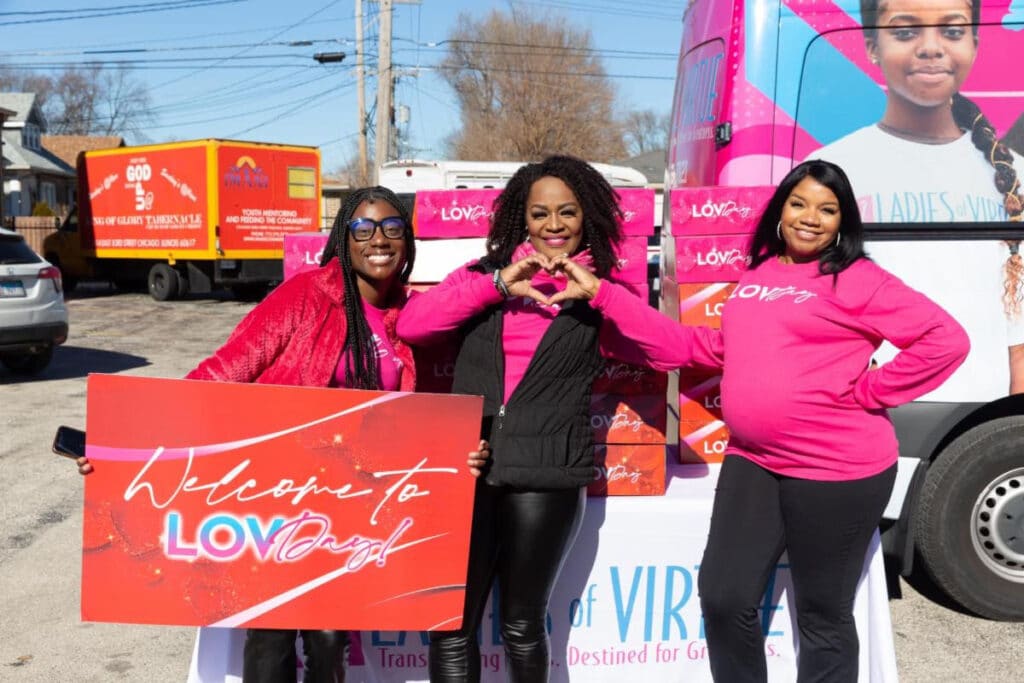
Ladies of Virtue is a mentoring and leadership program for girls, ages 9 to 18. Over the last 11 years they have served over 2,000 girls and families. LOV matches their participants with mentors and prepares them for leadership through our culturally relevant character building, career readiness and civic engagement curriculum. The team at Ladies of Virtue provides project management, collaboration and communication training via their two to four-month project experiences to empower girls to lead in the modern workforce. After graduating from high school, with successful completion of LOV’s leadership program, participants are mentored and supported for six additional years, from 18 to 24, as LOV 4 Life alumni.
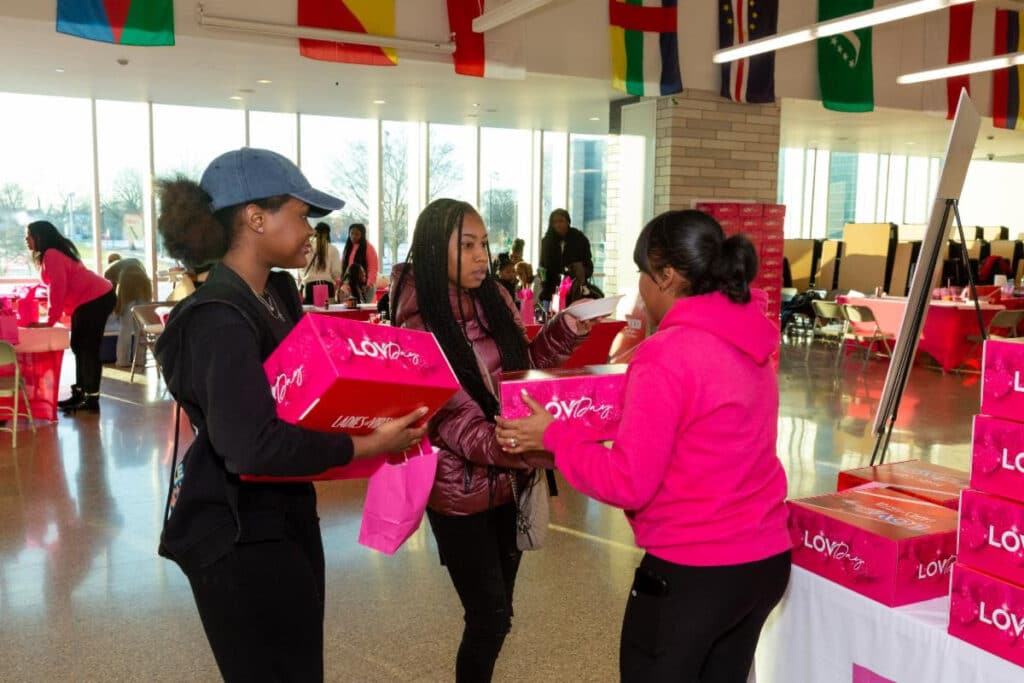
LOV Day was a community effort, obtaining funding from the Peace Fellows Mutual Aid Collaborative, drawing in fifty-five volunteers from 12 Corporate/Community Partners, and hosting events in six different schools and community centers. Jamila brought the proposal to fund LOV Day to the Mutual Aid Collaborative alongside 2019 Peace Fellow, Dawn Hodges.
The Mutual Aid Collaborative consists of 74 Black and Brown leaders and committed allies who live and work in the communities they serve on the South and West sides. They have raised over $100,000 to support several active projects. The Mutual Aid Collaborative met and collaboratively voted in January to provide LOV Day with funding to support the distribution of LOV Boxes filled with self-care items. Each LOV box included a teddy bear, chocolates and candy, a painting kit, hair care products, and Black history facts.
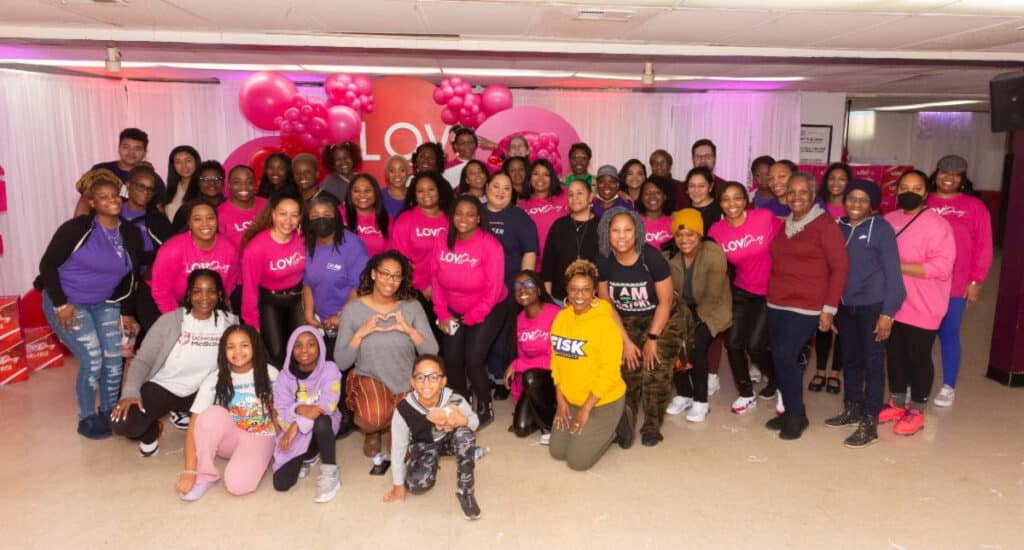
LOV Day served as a way to celebrate both Black History Month and Valentine's Day. Themes of Black history and culture were interwoven with the idea of providing girls with the space and opportunity to rest and care for themselves. LOV Day featured a self-care experience called “Black Girls Rest”. This event served 100 girls, twice as many as the previous year. Black Girls Rest included workshops on how to maintain healthy hair, skin care, and feminine care. Hair care stylists, cosmetologists, aestheticians, and an OBGYN all attended to provide guidance. Speaking to the themes of Black history and rest, one Lady of Virtue stated, ”All throughout Black history, slavery and during the Great Migration, Black people were constantly on the move and still to this day heavily dipped in GRIND culture. We need to STOP and REST.”
While 2022’s LOV Day centered more around the distribution of boxes, this year’s LOV Day focused heavily on programming, with Ladies of Virtue visiting six schools to hold self esteem and confidence workshops. Events include hair and makeup demonstrations, pillow decorating, mental health workshops, feminine and skin care tips, and candle making. The programs were conducted by program facilitators for the Ladies of Virtue and aimed to show Black Girls that they are and should be loved, nurtured, and protected. For instance, one workshop had girls identify what they love about themselves and encouraged their peers to support that expression of self-love.
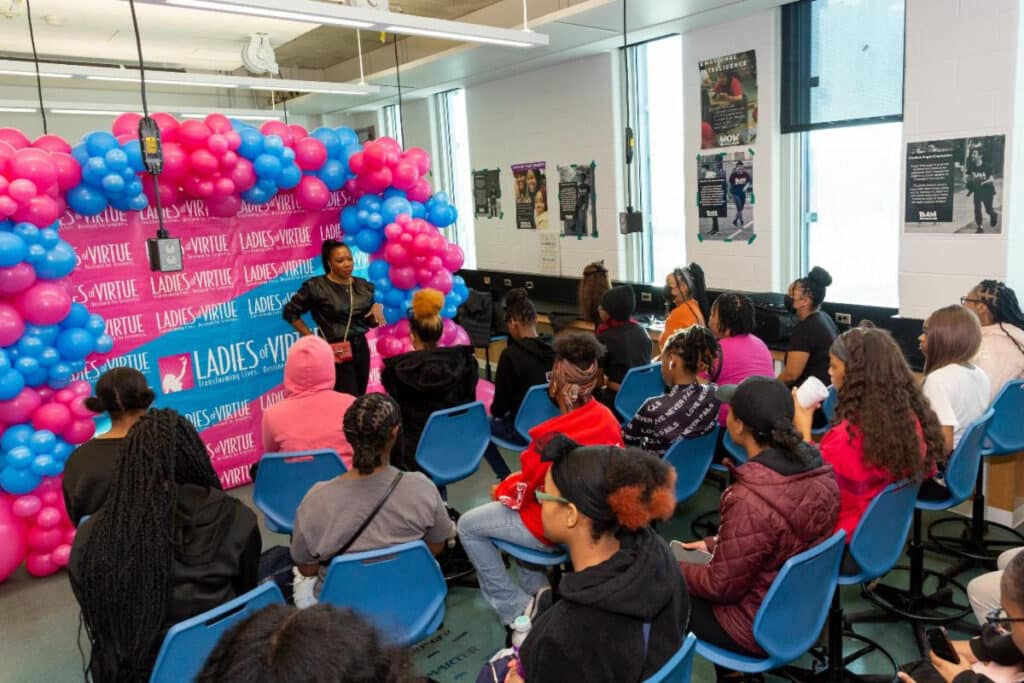
Jamila attended one of the LOV Day classes where girls were discussing when they were at their best. One girl that Jamila was working with said “Oh I love my smell because it reminds me of how my dad smells,” but then noted “ I really don’t talk about my dad much.” When Jamila asked why, the girl mentioned that he died a few weeks ago. Jamila reflected, “that really let me know that she felt like this was a safe space for her to express herself; that we were establishing a safe space for girls to just be themselves.”
To continue their mission of instilling purpose, passion, and perseverance in girls, ages 9 to 18, while preparing them for college, careers and to become change agents in their communities, Ladies of Virtues is always looking for volunteers. Volunteers serve as role models for their girls, parents, and the community. You can find volunteering opportunities for LOV at: https://www.lovchicago.org/volunteer
Generation Now 2.0: A Mutual Aid Collaborative Talk Show for Teens Produced by Teens
By: Michael Henderson, Director, Mutual Aid Collaborative
Generation NOW was conceived by Messiah Equiano, a 2021 Chicago Peace Fellow, and aims to provide opportunities for young people to work on a teen talk show that addresses everyday issues that teenagers face. The program pays teenagers to produce, direct, and act in the show and provides them with a safe environment to express their thoughts.
In August of 2022 Generation NOW filmed its first talk show that addressed “Dating and Violence”. Messiah Equiano, Executive Director of CHI-Rise, and Nicole Davis, Executive Director of the Talk to Me Foundation, saw first hand how therapeutic and empowering this platform was for teens. They deemed the first filming of Generation NOW as a success and proposed a second talk show to the Chicago Peace Fellows Mutual Aid Collaborative.
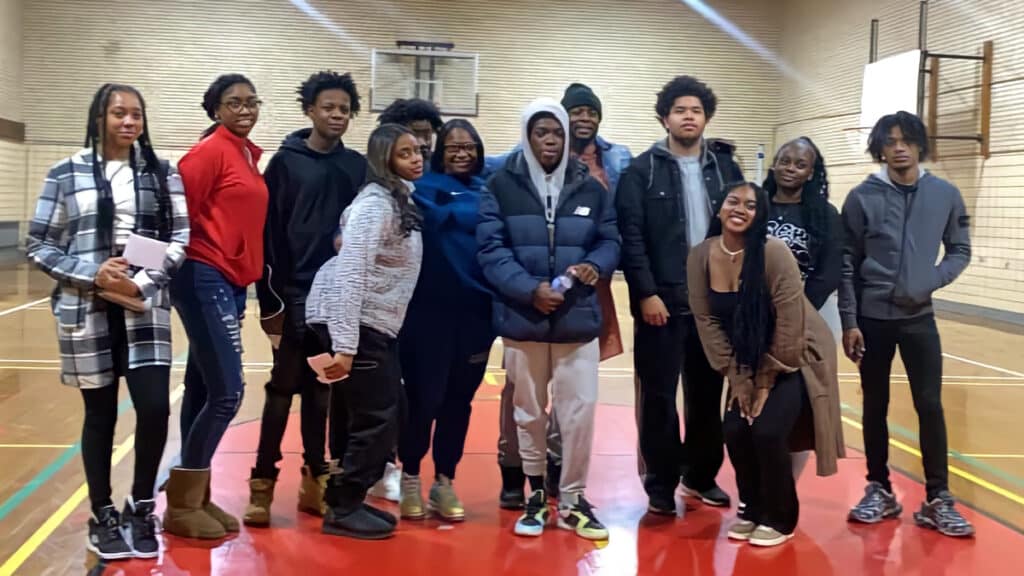
The Mutual Aid Collaborative consists of 74 Black and Brown leaders and committed allies who live and work in the communities they serve on the South and West sides. They have raised over $100,000 to support several active projects. The Mutual Aid Collaborative met and collaboratively voted to provide Generation NOW with the funding to film a second talk show at the Foster Park District.
Messiah and Nicole wanted to expand the dating conversation in the second filming and talk to teenagers about love. Nicole thought “Keeping with February as the month of Love and with so many young men and women at the ages of 12 and 13 dating, Generation NOW wanted to know what love looks like to them”. On Saturday, February 4, 2023 Generation NOW filmed a talk show focusing on young peoples’ understanding of love entitled “The Love Recording”.
Continuing the vision of the first talk show. Generation NOW provided young people with a safe setting to be open about their opinions, while also providing them with experience with different aspects of television production. Teens work on the project as writers, production members, or actors and were compensated for their work. Funds provided by the Mutual Aid Collaborative were used to pay ten teenagers $250 each for their involvement in a day of filming.
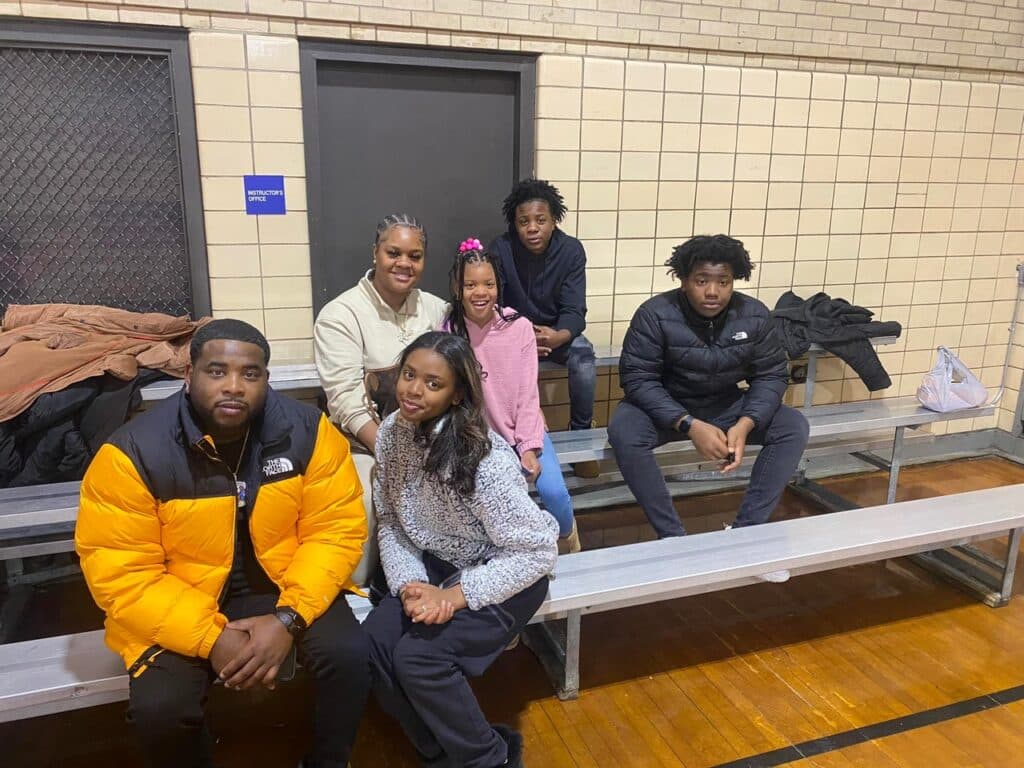
Messiah and Nicole agreed that teens are not always given the space to feel safe in the city of Chicago or in their homes and “it's ok to open up” and be vulnerable. The intimate and safe filming provided teens with a platform to voice their beliefs without judgment, but also with a chance to enact their visions in a production and to work together collaboratively. Each participating teen/young adult performed their expression of love through forms such as poems, monologues, and skits. Following the performances, discussions were held to explore the themes and messages of the show. The transparency and vulnerability of the answers according to the 25 plus attendees had the crowd “up in smoke”.
For one scenario performed at the “Love Recording,” young men and women were given flowers and candy to reenact how they will ask a person out for a date. The attendees were amazed at the vulnerability in the response and stories from the teens. The majority of the girls suggested that it's the responsibility of the guys to ask the girls out for a date, while some of the boys agreed that if a girl is asked out and has a boyfriend the girl should let the guy know. Another vulnerable teen shared his experience and story of being assaulted by a girlfriend. These stories allowed the teens to have open conversations about dating and the different kinds of expectations and responsibilities they feel in romantic life. The second filming was as successful as the first with both teens and parents participating with excitement.
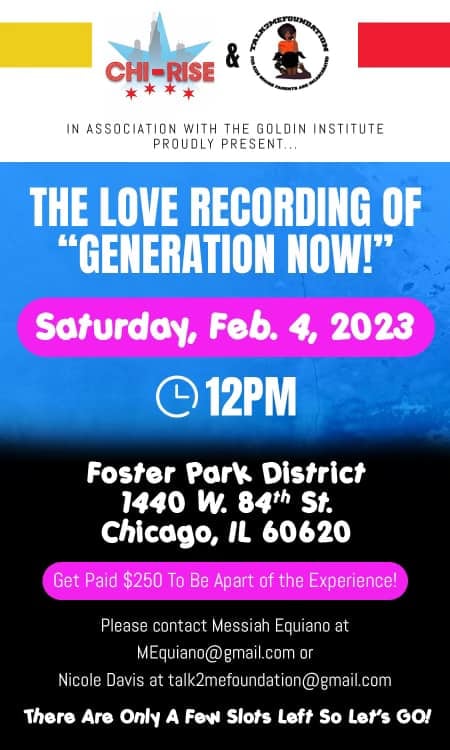
Generation NOW aims to provide teens with opportunities to express themselves. Messiah believes it's important to let teenagers know “they value their voices, they value their experiences, they value their input and their involvement in their communities”. CHI-Rise and the Talk to Me Foundation “want to give back” to their community and teens. They are looking to produce episodes of Generation NOW monthly. They are also looking towards expanding the programs to different communities, and looking specifically at communities with higher risks of violence and to get more parents involved.
A December To Remember: Mutual Aid Collaborative Organizes a Toy Drive
By Michael Henderson, Director, Mutual Aid Collaborative
Juliet Jones, a 2021 Chicago Peace Fellow Alumni and the Co-Founder and Director of The Original Sixty Fourth Street Drummers, Inc. “wanted to bring children back to play” due to the set back and effects COVID-19 had on kids during the holidays. She thought holding a toy drive to benefit children in under-served communities would be a good way of accomplishing this goal.
Juliet, passionate about making a difference for children, proposed The Universal Toy Drive to the Chicago Peace Fellows Mutual Aid Collaborative. The Mutual Aid Collaborative consists of 60 Black and Brown leaders and committed allies who live and work in the communities they serve on the South and West sides. They have raised over $100,000 to support several active projects, including The Universal Toy Drive.
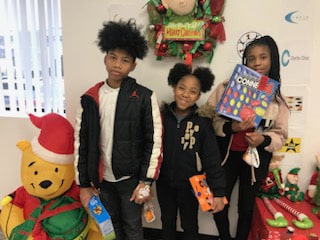
Juliet organized the Universal Toy Drive along with Dr. White, the TEECH Foundation, Clarity Clinic and Bethany Union Church to bring toys to disadvantaged children on the Southside of Chicago. Members from The Mutual Aid Collaborative, including Cosette Nazon-Wilburn of the LUV Institute, Jamila Trimuel of Ladies of Virtue, Gloria Smith of the Black Star Project, and Margaret Murphy-Webb of the Southside Jazz Coalition, all came together as a community to support Juliet. These leaders organized quickly by sharing flyers, sending and processing invitations, and reaching out to their network of parents.
On December 21, 2022, the Universal Toy Drive became a safe space for 113 children to play and receive gifts. The Universal Toy Drive was more than just giving toys away. Juliet knew the children who would be at the toy drive “normally missed out on a lot of things, not just toys, toys were the medium.” It was the intent of Juliet and the Mutual Aid Collaborative to bring joy to the lives of the under-served children and provide them with an opportunity to be kids.
Juliet was overwhelmed with joy as she got an opportunity to witness a village of children from a variety of places. Families who are dealing with HIV, children from the foster care system, children whose parents are incarcerated or in recovery, and other children from the community received all sorts of different toys, gift cards, coats, and other bags of goodies.
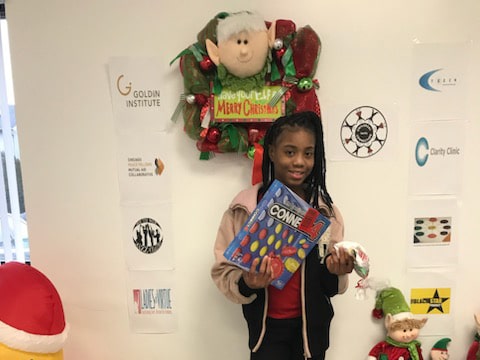
The 113 guests with their families that attended The Universal Toy Drive played board and video games, watched YouTube videos, played hopscotch and jump rope. They drank apple cider, hot chocolate, ate cookies and took pictures with Santa. The energy in the room was so amazing and filled with joy that the children received their gifts but, “didn't leave, they stayed and played, it was great”.
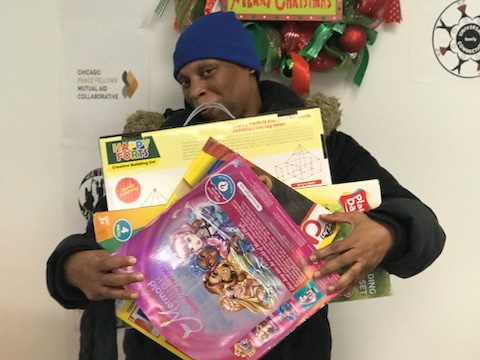
The collaborative efforts to touch the lives of children went beyond the imagination of Juliet’s and the village of local leaders. The Universal Toy Drive was a great success, providing 113 children with toys and gifting additional toys to The Universal Family Connection to use in their playroom for foster children. Juliet is ready for 2023 and has plans to continue to collaborate and organize with other community organizations to hold another Universal Toy Drive.
Parade of Hearts Across Chicago
2020 Chicago Peace Fellow Cosette Nazon-Wilburn unveiled ten community-created hearts that will be showcased across neighborhoods in Southside Chicago on September 8th. These five-foot tall fiberglass hearts form the “Parade of Hearts,” a community based initiative designed by the LUV Institute with support from the Chicago Peace Fellows Mutual Aid Collaborative.
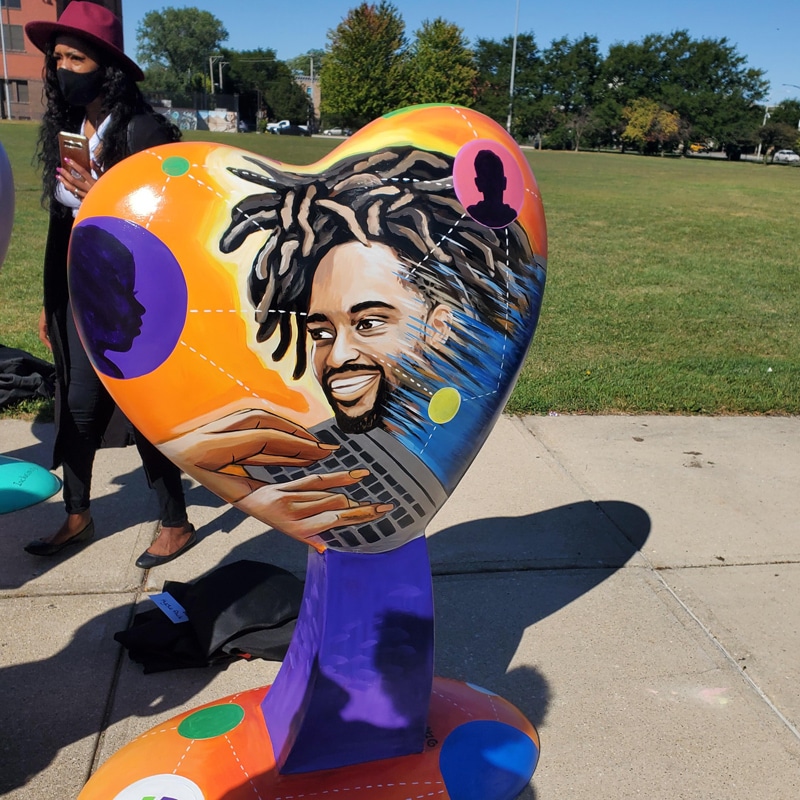
The hearts were collaboratively designed by peace circles in ten neighborhoods: Chatham, Douglas, Grand Boulevard, Greater Grand Crossing, Hyde Park, Kenwood, Oakland, South Shore, Washington Park, and Woodlawn. The peace circles provided an opportunity for the LUV Institute to partner with three other Chicago Peace Fellows: David Gonzalez, Michelle Day, and Jennifer Maddox.
In the peace circles, artists and community members came together and discussed how they would like to showcase their neighborhood’s “new normal” in light of the COVID-19 pandemic and recent political tensions.
Ten hearts were showcased at the launch of the Parade of Hearts; each heart will be placed in a South Side community.
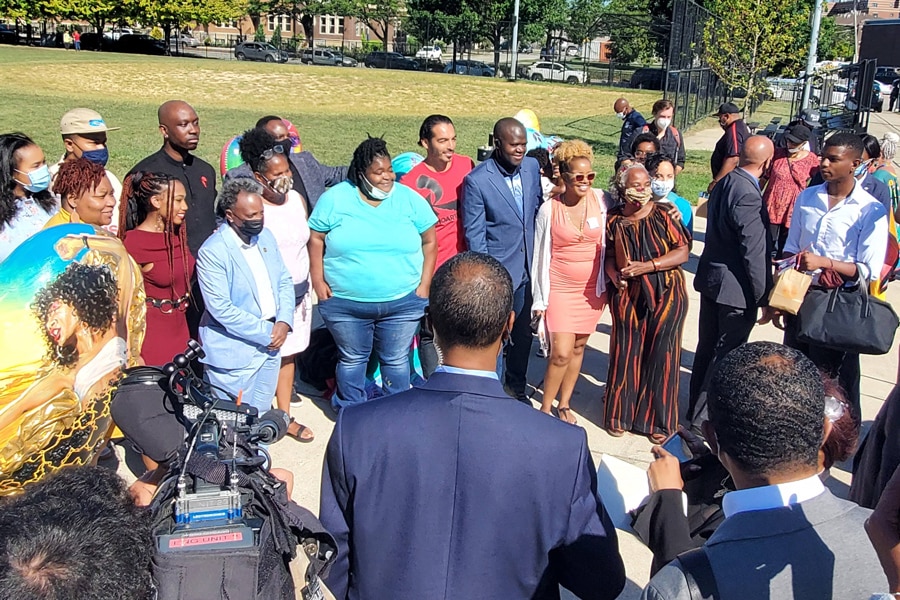
Creating a Parade of Hearts with Communal Visions
Artists acted as community representatives, expressing communal visions of neighborhoods that are beautiful and resilient. One local artist that worked on the project was Damon Lamar Reed, who created hearts for two communities, Nichols Park and Douglas. The heart that he created with the Douglas community is centered around a theme of trust with a man covering a woman’s eyes at its center and a background of stitched patchwork. The patchwork of the heart is meant to evoke memories of mothers patching ripped clothes and making them stronger than they were before. Damon and the Douglas community see this heart as symbolic of their community’s resilience and ability to memorialize the past while creating a stronger community.
Through the parade of hearts, the LUV Institute hopes to revitalize South Side communities through introducing a large-scale public arts project. Cosette emphasizes the importance of bringing arts programs to communities that are often left out of public arts initiatives. The Parade of Hearts aims to act symbolically as an expression of love trumping all, but also to bring prosperity to the featured neighborhoods. She hopes that people will come to visit the hearts and bring tourism to neighborhoods of Chicago that don’t often receive it.
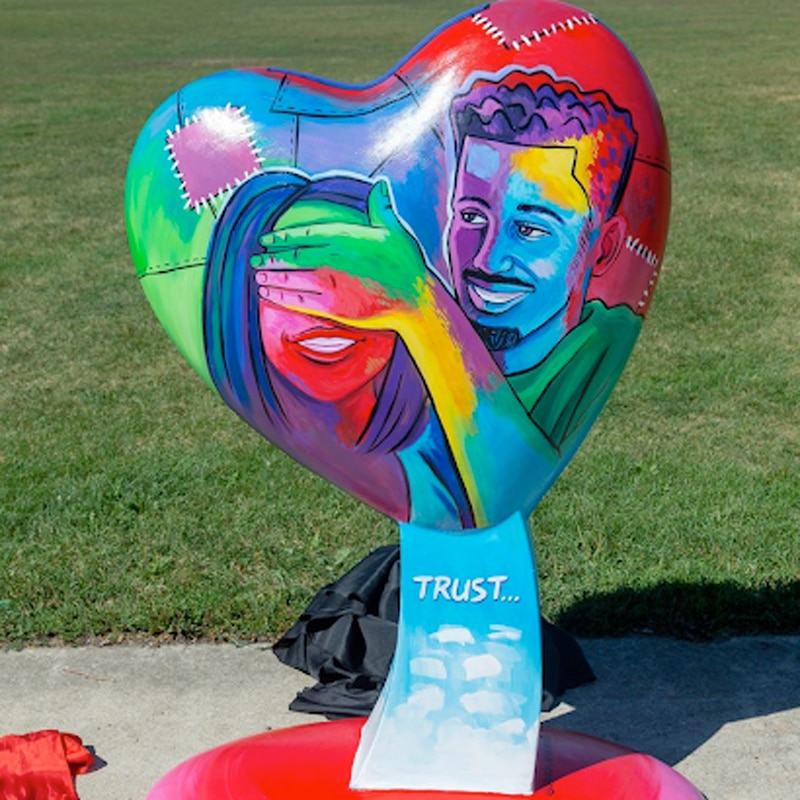
Hearts Will Show that Love Trumps Hate
The process of creating hearts was chronicled by a videographer who will release a documentary talking about the organizations involved in helping neighborhoods design their hearts as well as histories of the neighborhoods themselves. Next year, the LUV Institute will facilitate a digital treasure hunt around the Parade of Hearts, in which people can explore virtual histories of the hearts and their surrounding neighborhoods.
The hearts have started many conversations about peacebuilding in Chicago and many people and institutions have reached out to Cosette, moved by the Parade of Hearts’ message that love can trump hate. For its launch, the Parade of Hearts raised $115,000, surpassing its goal.
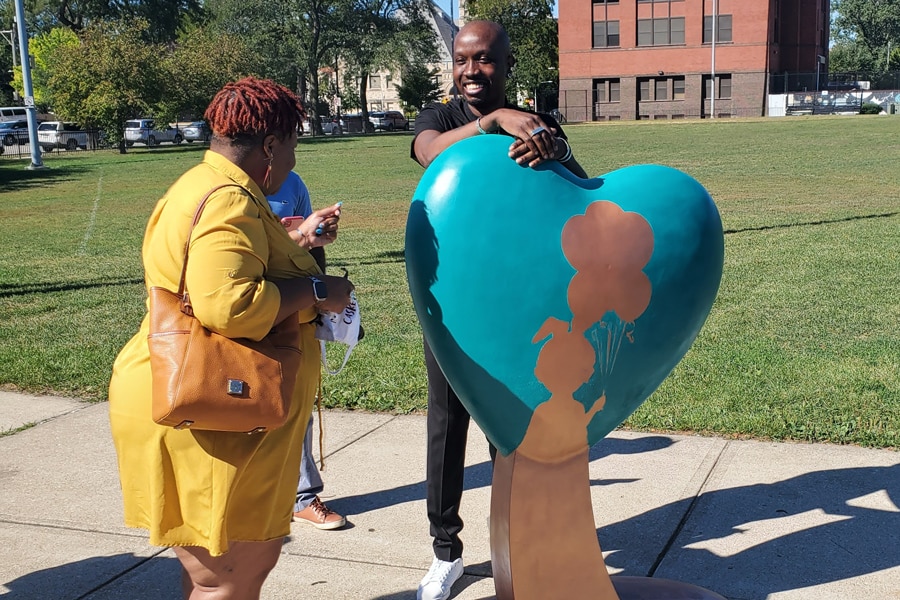
The LUV Institute intends to use this money as a seed for a larger community outreach program. Cosette envisions that soon, all 77 community areas in Chicago will be able to create hearts and that money raised through the parade can be used for restorative justice projects. In the future, she plans for the LUV Institute to partner with other local non-profits to launch similar events and initiatives that integrate the arts with community-building and trauma recovery.
